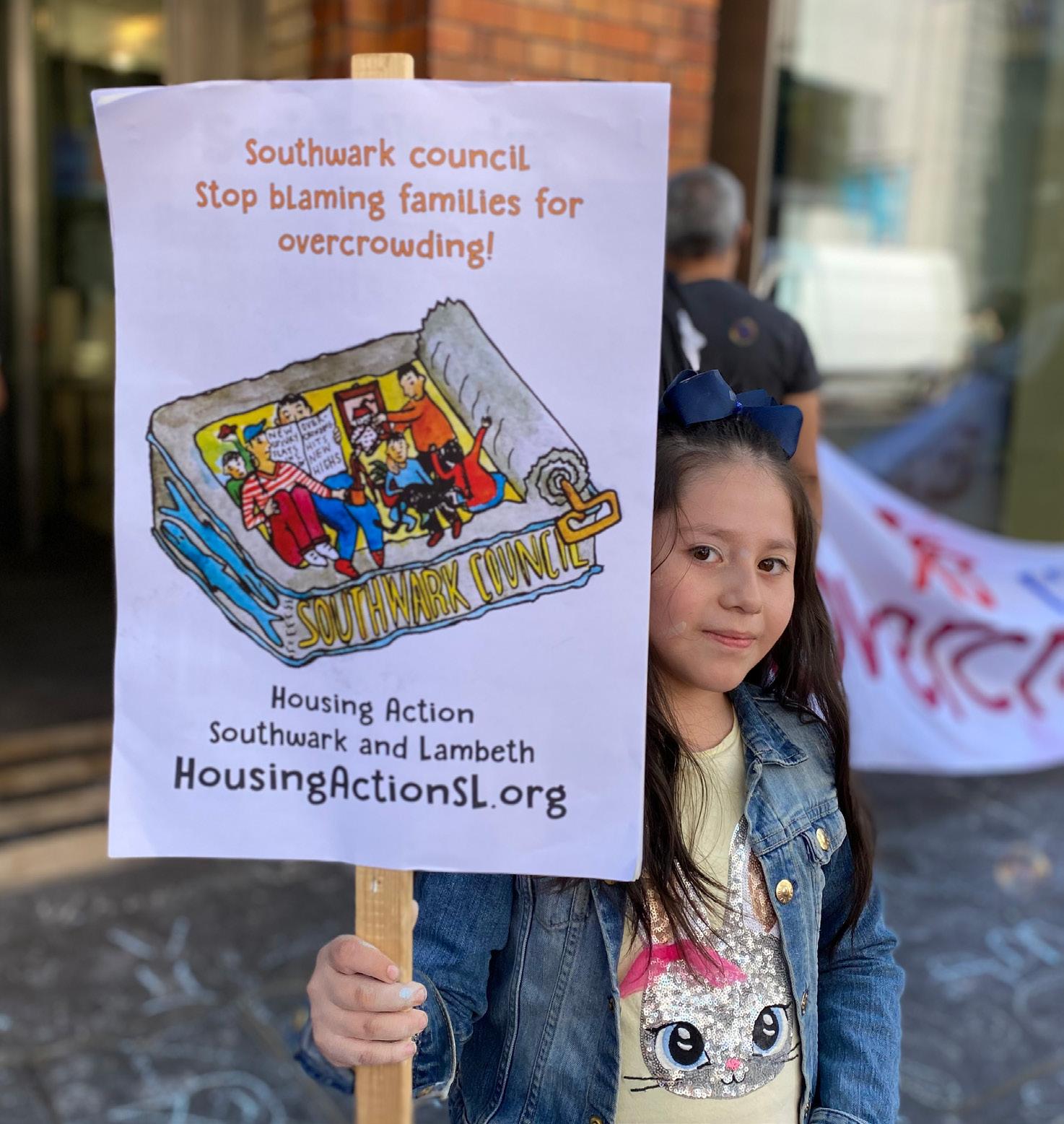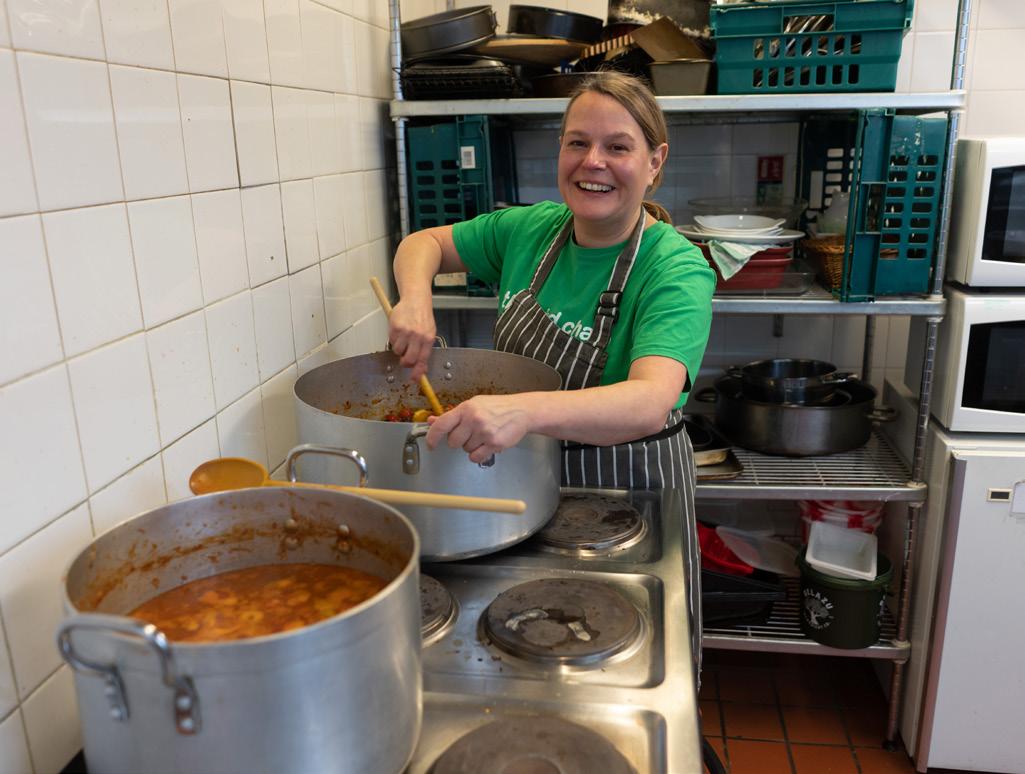Funding for a fairer London.
Funding for equality change better pay equal rights justice communities safer homes processes families advice a fairer London.

Funding for equality change better pay equal rights justice communities safer homes processes families advice a fairer London.
I’ve been familiar with the work of Trust for London since I first moved to London 26 years ago. I’m strongly committed to our approach to tackling poverty as a funder, involving those most affected in the work and learning from their experience, while also making sure what we’re doing is effective. It’s really important to be driven by values, but commitment to values isn’t enough. We need to ensure that what we’re doing is having the intended impact, and in this annual review we set out what and how we’re doing.
With the pandemic and then the cost-of-living crisis, the long-standing and persistent issues of poverty and inequality have worsened. London is a large and thriving global city, often associated with the shiny and iconic buildings of the City and Westminster. But this is a very limited view. Millions of people are struggling and were struggling even before the cost-of-living crisis and pandemic.
London is too often contrasted with or even opposed to the rest of the UK. I find that framing counterproductive when it comes to designing policy solutions to tackling poverty, wherever it exists. It’s also a divisive frame that misses out on all of the ways we’re connected, and the shared challenges facing people on low incomes in London and across the country.
Although we’re a relatively large funder for London, the scale of the problem is much bigger than the resources we have. We need other citizens, individuals and institutions to work with us. I welcome our partnerships with other funders on work like the London Living Wage, temporary accommodation and our new racial and disability justice programmes.
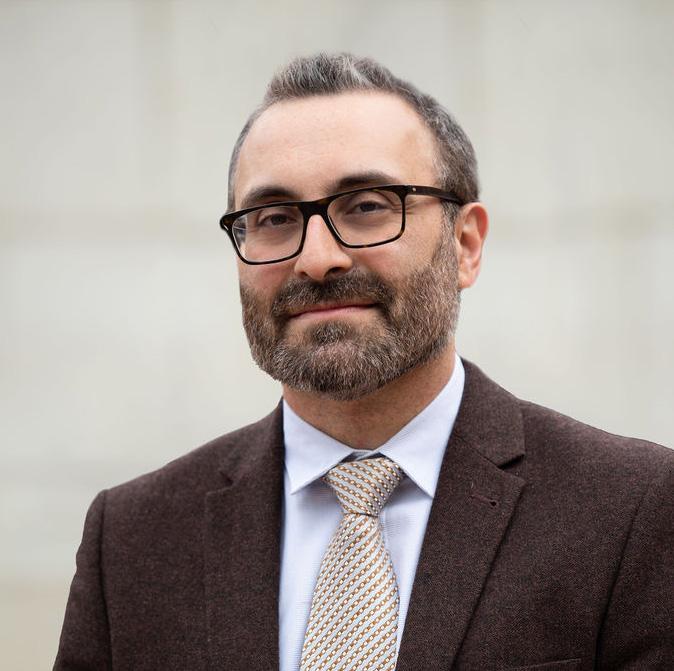
Over two decades we’ve seen the salience of racial justice rise and fall in the UK. The murder of George Floyd raised the issue in the UK and internationally, as the murder of Stephen Lawrence did in the 90s. People do seem to be more aware of the reality of the experience of racism, and it’s unfortunate that it took the murder of someone in America to make that better understood. But we can’t ignore the racism and inequalities that still exist in Britain today. Although there’s increasing awareness and support for racial justice, there are challenges in terms of pushback. Trust for London will continue to support work to address the impact of racism on people’s lives, and learn from the work being done across the capital in civil society to challenge it. That bottom-up work has put racial justice on the agenda and has lessons for addressing other forms of inequality and poverty too.
In my time on the board so far, I’ve been impressed by the commitment and expertise of the Trust for London staff and the rest of the board. I also want to recognise and pay tribute to my predecessor as chair, Jeff Hayes, who guided the team with integrity and diligence over 13 years, and who was chair during the time this review covers.
I’m looking forward to working on developing our new strategy and delivering it in the coming years. I’m also excited to get involved with work already underway for us to become a more relational funder. Working harder to understand our power, and reflecting on how we enable others.
Dr Omar Khan ChairThis welcome is my first as our newly appointed chair. I’m delighted to introduce the excellent work of my colleagues, of the many organisations we support and learn from, and of the wider board of Trust for London.
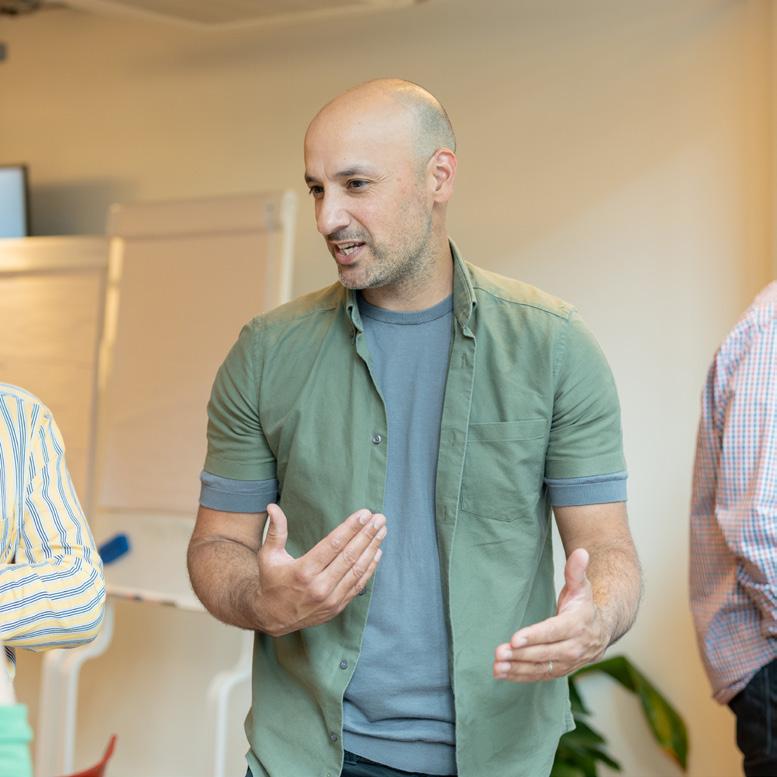
Our mission is to reduce poverty and inequality in London. In 2022, this goal seemed further away than ever before. The cost-of-living crisis has pushed more people into poverty than anytime in living memory, and crisis on top of crisis has worn down even the most resilient.
When things are this tough, I don’t think anyone should feel pressured to look for positives. But if you believe things can change, looking to London’s civil society for hope is a good place to start. Organisations across the city stepped up their work to help low-income communities throughout 2022. Being able to support this work is one of the many privileges of working for an independent, endowed charitable foundation.
We’ve been prioritising funding projects that tackle the underlying causes of poverty since 2018. Issues like unaffordable housing, the immigration system, badly paid and insecure work and an inadequate system of social security. This work continued in 2022 and we’re now entering the final year of a strategy that has served this aim well.
But we’ve also had to adapt to the world around us, and the pandemic brought new priorities to light. Alongside our partners City Bridge Trust, we committed a combined £7m towards racial justice and disability justice.
Our Racial Justice Fund has so far distributed over £1m to advance economic justice in Black and minoritised communities. The Disability Justice Fund is in its infancy, but has recruited a highly experienced panel of Disabled activists and movement builders to work alongside us, and make decisions about where the funding should go.
We also launched a new fund to support organisations working with households in temporary accommodation, working with the Oak Foundation. The £1.5m fund provides much needed money to organisations on the frontline, while also trying to build momentum on tackling some of the deeper issues.
The severity of the cost-of living crisis also meant we needed to step into what I can best describe as humanitarian support – funding activities like distributing food parcels and providing warm spaces. We did this by working in partnership with other funders through London Community Foundation’s Together for London programme.
We also provided extra money to funded partners to help them deal with the impact of inflation on their own organisation, increasing most existing grants by around 10%.
As we’ve rolled from crisis to crisis, we’ve made the decision to give out more grant funding and social investment than ever before. As a permanent endowment, we’ve done this in the knowledge that there is a trade-off: helping more people now means that we’ll be able to help less people in the immediate future. This year we spent 7.2% of our endowment, in 2021 we spent 11.8%, and in 2020 it was 6.8%. The value of our endowment has reduced, and although the amount we’ll be able to give out in the future is going to be lower, spending more now has been the right thing to do.
The year ahead will see us accelerate work to develop our 2030 funding strategy, which will launch Spring 2024. Our new strategy won’t be radically different from our core mission. We’ll continue to focus on the drivers of poverty, rather than the symptoms. We’ll focus on evidence, and bring thoughtfullness to our decision making. And we’ll continue to view it as our duty to fund work that helps people struggling right now, but also tackles the underlying causes of London’s high rate of poverty.
Our refreshed strategy will not be developed in isolation. Throughout the year we’ll work with partners from across the public sector, civil society and academia to explore issues and identify clear goals we can collectively work towards by 2030.
Alongside this we’ll be working on improving the way we operate and communicate. This includes moving our digital grants management to Salesforce, which will mean a better experience for the organisations applying for and receiving funding. We’ll make substantial improvements to our website, including updating our visual identity so that it is better suited to a world where so much communication happens on social media. And we’ll refresh our organisational values, so we have a clearer sense of who we are as we tackle the challenges ahead.
These challenges will be significant. The cost-of-living crisis shows no sign of improving. London’s housing has become even more unaffordable. And in the eyes of many politicians, London’s concerns continue to be played off against other regions that are likely to be decisive in the next General Election.
We believe that change is possible in spite of all these challenges, and we’re committed to helping make it happen. So, we’ll continue to use our funds to support organisations that are fighting for a better London in the year ahead. We know it won’t be easy, but we’ve been here for the long haul and that’s where we'll remain.
Manny Hothi Chief executive
During 2022 we gave out over £13m, totalling 139 grants. Alongside this we provided £3.3m in social investment to support six growing social enterprises. We also invested a further £1.4m to provide additional support in the form of convening, co-production and participatory grants processes, evaluation and capacity development.
The bulk of our grants were awarded through our seven priority areas, but we also gave out responsive funding to provide extra support during an especially challenging year. We gave out £825k through the London Community Foundation, for organisations providing cost of living crisis support. To help existing funded partners, we made 10% uplift payments on the remaining balances for all active grants.
Total grant funding
£13,445,326
In 2022 we doubled down on our commitment to fight for racial and disability justice, launching two major new funds in partnership with City Bridge Trust. £4m has been awarded to the new Racial Justice Fund, and £3m for the new Disability Justice Fund.
Total number of grants
139
Social investment commitment £3.38m
Number of grant applications recieved
268
Number of grants to organisations not previously funded 31 (24%)
38%
declines 166 success rate
repeat continuation
67 (53%) repeat different purpose
29 (23%)
Mean grant award (main grants, excluding connected communites)
£105,183
Good homes and neighbourhoods
Better work
Decent living standards
Shared wealth
Pathways to settlement
Stronger voices
Connected communities
Exceptional Racial Justice Fund
Good homes and neighbourhoods
Better work
Decent living standards
Shared wealth
Pathways to settlement
Stronger voices
Connected communities
Exceptional Racial Justice Fund
Primary activities as % of our grant making in 2022
Capacity building
Campaigning Service delivery - advice
Grants focused on specific beneficiary groups as a % of funding
Migrants (any status)
Black, Asian and other racialised people
Women
Children and young people (under 25)
Deaf and/or disabled people
Older people (over 60)
LGBT+ people
NOTE: A small number of grants are counted twice – where they focus on intersectional identity – e.g a grant supporting Black Women is counted under Black, Asian and other racialised people and Women.
Black, Asian and other racialised people
Migrant Women
Deaf and/or disabled people
Local community Residents association or tenant led LGBT+
Older people
Children and/or young people
Pan-equalities
45% of funding to user led organisations
Of
which the largest were those led by communities experiencing racial exclusion
In 2020 Funders for Race Equality (FRE) set criteria and guidance to enable funders to understand their funding in relation to racial equality. FRE scores funders against four key independent criteria, and in 2022 we concluded an audit in line with this.
We included all grants awarded within our current 2018 – 2024 funding strategy in the analysis, active as of 6 June 2020. This meant we included 350 grants with a combined value of £40.4m in the audit.
146 with a mission to address racial inequality
88
also with leadership from communities experiencing racial inequality
2:
53%
350 grants awarded of grants with the explicit aim to reduce racial inequity
184 grants
70% tackling the consequences of racial inequity
30% tackling root causes
During 2022 we faced a cost-of-living crisis that pushed more people into poverty than at any time in a century, and this in turn had a significant impact on our partners in civil society. Like others we wanted to act quickly and we gave out an extra £3.7m in emergency funding to organisations across the city, including to London Community Foundation’s Together for London fund.
The Russian invasion of Ukraine in February 2022 led to millions of people fleeing their homes to seek safety. We provided grants to two organisations supporting Ukrainians in London.
The Work Rights Centre
£44,603
Supporting the Ukrainian community through advice and casework on immigration, job searching, employment rights and welfare benefits. The funding was to finance the full-time salary of an experienced Ukrainian and Russian speaking adviser, expanding capacity to deal with the growing volume and complexity of queries.
£64,860
Funding for the delivery of comprehensive support, advice, guidance and sign-posting around housing, education, health, legal and financial matters for displaced Ukrainians, in collaboration with statutory bodies, other voluntary sector organisations and specialists in each field.
£800,000
A grassroots community response to the cost-ofliving crisis in London, with different funders uniting to provide funding, organised by the London Community Foundation. Funding for small, local community organisations with annual incomes of under £500k to allow them to provide emergency support. Support for food, essential items, mental health, financial and welfare advice, prioritising those most effected by the crisis such as people with disabilities, older people, Black and Minoritised Ethnic communities, carers and the homeless.
£2,827,283
To support the organisations we fund to navigate the crisis in 2022, we awarded a 10% uplift on all outstanding balances on active grants. This led to uplifts being awarded on almost 250 active grants.
Partnerships with other funders help us reach more people and create deeper impact. In 2022 we committed £8.5m to programmes working in partnership with other major London funders.
Amount: £3 million
Partner: City Bridge Trust
Aim: To build the capacity of DPPOs to advocate for the lasting system change needed to achieve an equitable and socially just society.
Duration: 2022-27
Amount: £4 million
Partner: City Bridge Trust
Aim: To increase economic empowerment among London’s Black and minoritised communities.
Duration: 2022-27
Temporary accommodation
Amount: £1.5 million
Partner: Oak Foundation
Aim: To strengthen the voice, connections and influence of people in Temporary Accommodation (TA) and improve people’s experience of TA.
Duration: 2022-25, with the first grants awarded in the summer of 2022.
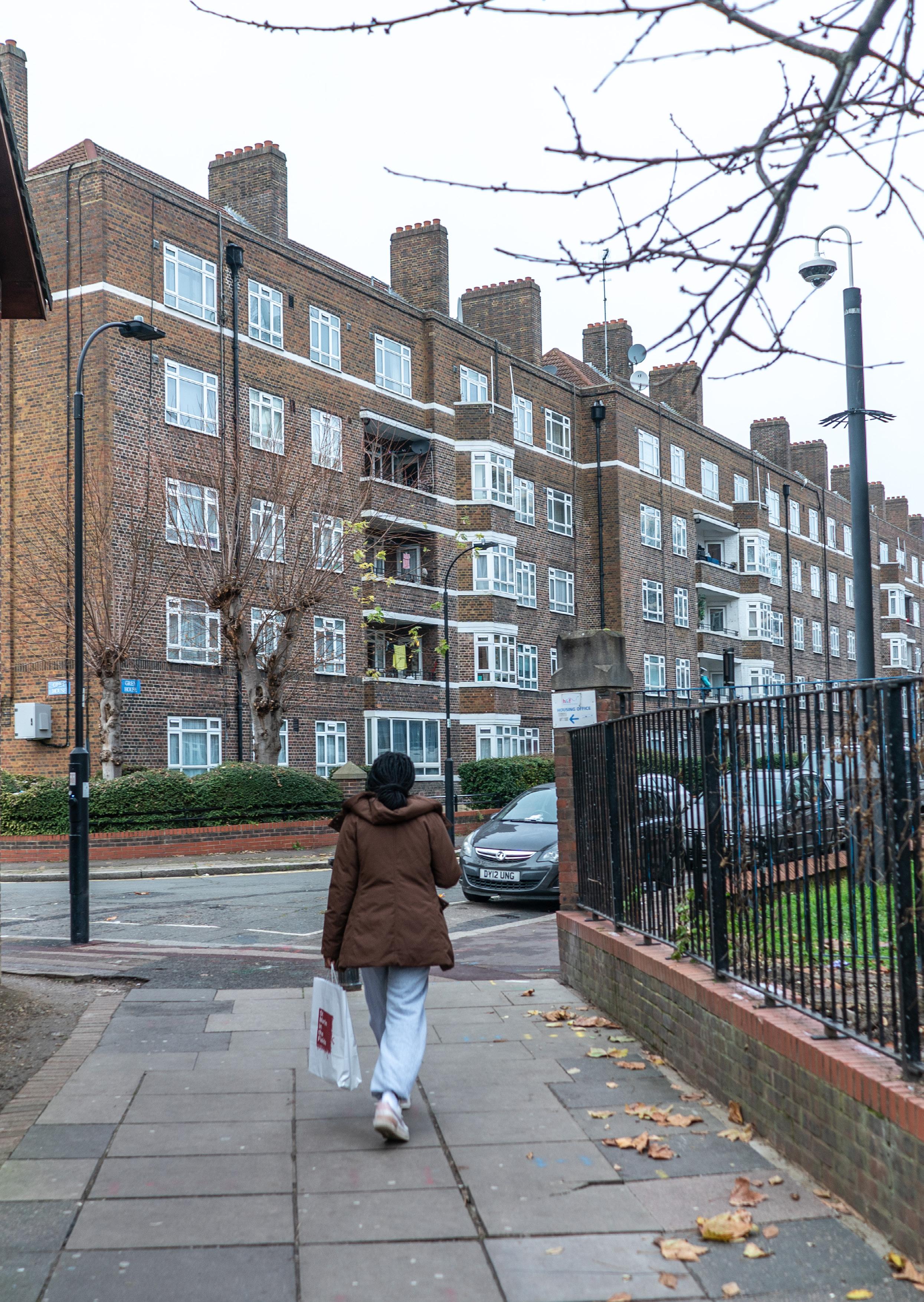
In London, 33% of families in poverty include a Disabled person and almost half of people living in poverty are Disabled or are living in a household with someone that is Disabled. At the same time, chronic underfunding has been reducing the capacity of Deaf and Disabled people’s organisations (DDPOs) to mobilise for equal rights and social justice.
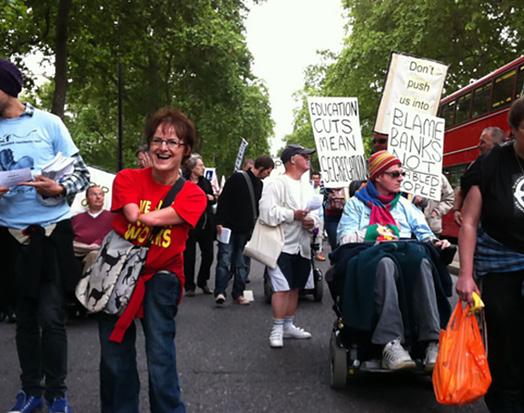
In 2022 we committed £3 million for disability justice, in partnership with City Bridge Trust. The fund will work to build the capacity of DPPOs to advocate for the lasting system change needed to achieve an equitable and socially just society.
33%
A team of four disabled leaders and influencers were asked to nominate a diverse group of Disabled activists and movement builders for the Disability Justice Fund's panel. The main goal is to put Disabled people front and centre in the decision-making process for the fund, including shortlisting and final decisions. This collaboration between the panel members and Trust for London provides a unique opportunity to implement co-production and participatory principles, facilitating an effective grant-making practice.
Though there have already been some challenges along the way, the effort is considered valuable. The panel will work with Trust for London until 2026, covering the entire fund duration. Lessons learned from this experience will be shared with other funders, contributing to more inclusive and equitable practices.
of households in London with a disabled person in the family are in poverty
Simone Aspis has worked with Inclusion London since 2022 and has 25 years’ experience of campaigning with and for Disabled peoples’ human and civil rights, working with a broad range of organisations.
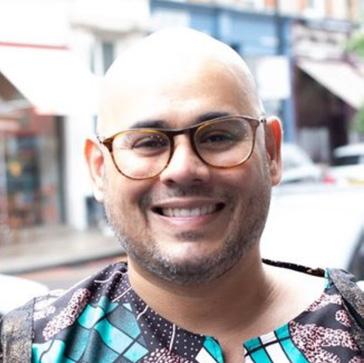

Shani Dhanda is one of the UK’s highest-profile and most influential disability activists and a multi-awardwinning inclusion specialist, working with global companies, broadcasters and the UK government to break barriers and integrate intersectional inclusion and accessibility into their frameworks.
Tasnim Hassan is a doctoral student at Durham University researching the intersection of disability & race, which looks at how Black and Brown Disabled people negotiate and navigate their intersectional identity. She is also the disability & coproduction lead at Black Thrive.



Dr Amo Raju is one of the longest serving ceos of a user-led Disabled people’s organisation in the country, having been at the helm of Derbybased Disability Direct for over 28 years.
Becca Bunce is a human rights advocate. Her work and research focus on how people with lived experience of inequalities participate in and lead social change. Becca is currently undertaking a PhD studentship in Public Policy and Design Thinking at King’s College London and UAL.

Tara Flood is a disability rights activist and has worked in the Disabled people’s movement for many years at a local, regional, national and international level. She is currently the strategic lead for co-production at the London Borough of Hammersmith and Fulham.

Iyiola Olafimihan is a Disabled consultant/ activist and campaigner who has been involved in disability justice work for over 20 years, community engagement, capacity building (including disability equality training), policy and human rights law.
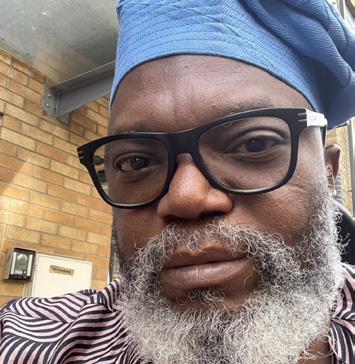
Isaac Samuels is a Disabled person with lived experience in health and social care, who employs his own personal assistants. He is the chair of the National Co-production advisory group (Think Local Act Personal) and is passionate about personalisation and how this can support Disabled people to have the best possible lives.
Wealth and income imbalance is at the heart of racial injustice. The clear link between race and poverty in the UK is backed by evidence, with Black, Asian and minority ethnic households twice as likely to be living in poverty as their white counterparts.
In 2022 we committed £4 million, in partnership with City Bridge Trust, to increase economic empowerment among London’s Black and minoritised communities. The fund will directly resource Black and minority-led organisations working at the intersection of racial and economic justice. It will also bring fresh voices, build alliances and pilot new ideas to help increase wealth and income in Black and minoritised communities.
CommUNITY Barnet is researching the barriers currently faced by local Black businesses. This work will inform a campaign to increase investment and support of Black social enterprises and entrepreneurs.
The partnership is to support and work with other community-led organisations campaigning against the impact of gentrification on migrant businesses and ensuring that race is on the agenda of the London plan.
Money A+E is a Black-led social enterprise, providing accessible money advice and education. We’re funding a partnership with Fair Money Advice that will focus on overcoming barriers facing Black and minoritised Londoners from accessing financial products and services, while also increasing representation within financial services jobs.
Research into barriers to home ownership, and how this stifles economic growth for Black Londoners. This will be used to bring forward policy ideas informed by firsthand experience.
The Southall Community Alliance is as an umbrella organisation of more than 70 community groups supporting local groups. More than 90% of their users are Black, Asian and Minority Ethnic. The team will be using our grant to build an understanding of how to build rental income and asset related projects for the benefit of Southall’s minority communities.
The New Black Film Collective’s aims to become the UK’s leading agency for Black film. We’re funding the team to build on an existing campaign with the NASUWT (Teacher’s Union), calling for action to tackle the pay and progression gap between Black teachers and their white counterparts.
We are working with The Social Investment Consultancy (TSIC), which will be working with us and the funded organisations to ensure that insights and learning from the projects are fed into the development of the fund and into longer-term work to tackle racial injustice and economic empowerment.

Too many Londoners are struggling to get by. We know that poverty and inequality in London is driven by some fundamental, known issues. Change is possible. We fund work tackling those root issues where we can make the most impact on the lives of real Londoners, today and in the long term.
Over 2022 we gave out 120 grants within our seven core funding programme areas, at a total value of £11,557,593.
Good homes and neighbourhoods
Better work
Decent living standards
Total amount awarded
£11,557,593
Shared wealth
Pathways to settlement
Projects funded 120
Connected communities
Stronger voices
The cost of housing fuels poverty in the capital. Many Londoners do not have access to genuinely affordable, decent quality and secure housing. Creating more homes is essential, as are places that create a sense of community, where people can feel safe and can participate in their local areas. The wider environment is also vital, from the air we breathe to the open and green spaces Londoners have access to. We fund advocacy work, housing legal advice, action research and capacity and skills building.
Total amount awarded
£2.04m
Projects funded
22
We’re trying to encourage policy-makers, politicians and civil servants to tackle the root cause of the unaffordability of our homes, and make it easier for people to retrofit, maintain and care for them. Our research sheds a light on the ‘financialisation’ of our homes, why it makes conditions so challenging for the people living in them, and what we can do about it.
We have a unique approach combining research, influencing, and mobilising people to get our policy proposals adopted for better social outcomes. This approach alongside significant coalition building led to the Chancellor giving the Bank of England a new green mandate in 2021.

Central Hill Estate Residents Association
£1,000
Funding is for the salary of short-term sessional workers, to undertake a survey of the issues affecting the residents of the estate both secure and temporarily housed families and organise a petition to the council.
£48,000
Funding towards the costs of its #NoticeUs campaign to develop capacity of women living in TA in Greenwich to amplify their voice to seek change on the terms that families are placed in TA.
Empty Homes Agency Ltd
£60,000
Funding for a London-wide, community-led coalition leading into the 2024 GLA and General Elections. Advocating for a fair development policy platform to meet low-income housing needs and challenging the present housing investment model that creates growing numbers of empty and underutilised homes and increases housing poverty.
£105,000
Funding towards two, part-time posts to offer advice and policy support to West London Black, Asian and minoritised communities around TA.
Groundswell UK
£30,000
Funding to co-design a project in TA, health and homelessness. Groundswell is mobilising it’s networks of people with lived experience to identify priorities for people in TA, and developing a project that meets their needs and can create change.
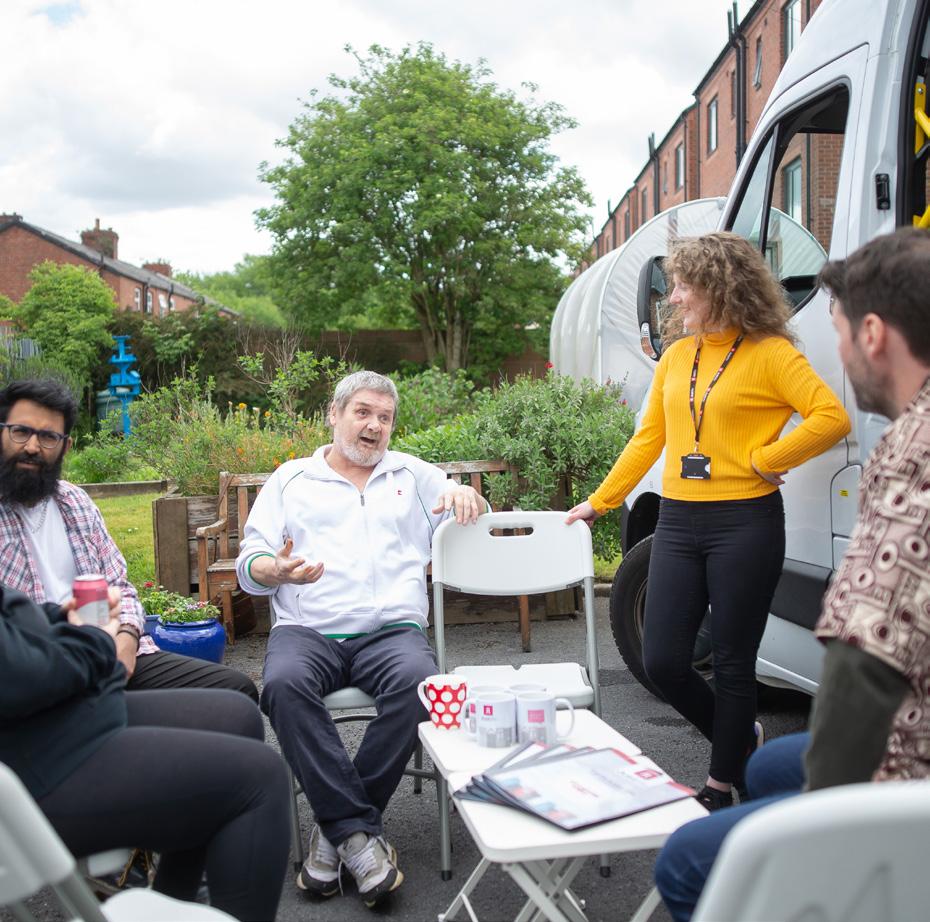
Island Advice Centre
£124,000
Funding for costs for a four day a week supervising housing caseworker, delivering housing legal advice and casework for those not eligible for legal aid, providing training and factsheets for volunteers, law students and other agencies,and taking up issues of wider concern with the authorities.
Justlife Foundation
£147,000
Funding is to establish Temporary Accommodation Action Groups (TAAGs) in five London Boroughs, with support from local strategic partners. Amplifying the voices of TA residents, connecting them with others and enabling them to advocate/lobby/influence for meaningful change.
£84,000
Funding for the continuation of a programme to support vulnerable groups secure and maintain decent housing. Integrating on and offline help to help people living in precarious housing understand housing and homelessness law in the context of the pandemic and cost-of-living crisis, and to identify ways to achieve change through legal and non legal mechanisms.
£59,000
Funding for the delivery of a PLE programme for community intermediaries, including volunteers, advocates, community leaders to supporting people in TA with their legal problems.
£100,000
Funding is for core costs to lobby and campaign for the housing needs of Gypsy, Roma and Traveller (GRT) communities in London.
£90,000
Funding is for a new project, Communities United for Play. The team is co-producing an online campaigning toolbox with and for Londoners in predominantly disadvantaged areas. This will equip them with tools and confidence to successfully challenge threats to local play spaces or services and influence policy and practice relating to play.
£150,000
Unrestricted funding to build the power of TA tenants to win significant improvements to conditions and contribute to wider policy change.
£100,000
Funding for support of London communities to make the capital a cornerstone city in the national campaign for systemic housing change, via winning more social housing at the next London Mayoral and General elections.
£66,000
Funding for the N’hood Forum community development worker who will facilitate the forums, engage at least 1,000 citizens including Arabic speakers, and build understanding of neighbourhood planning within the community.
£42,000
Funding for research into the impact TA has on people living with HIV and recommendations for Local Councils on how to best accommodate those living with HIV in TA. Also supports individual casework, empowering individuals to take part in the research.

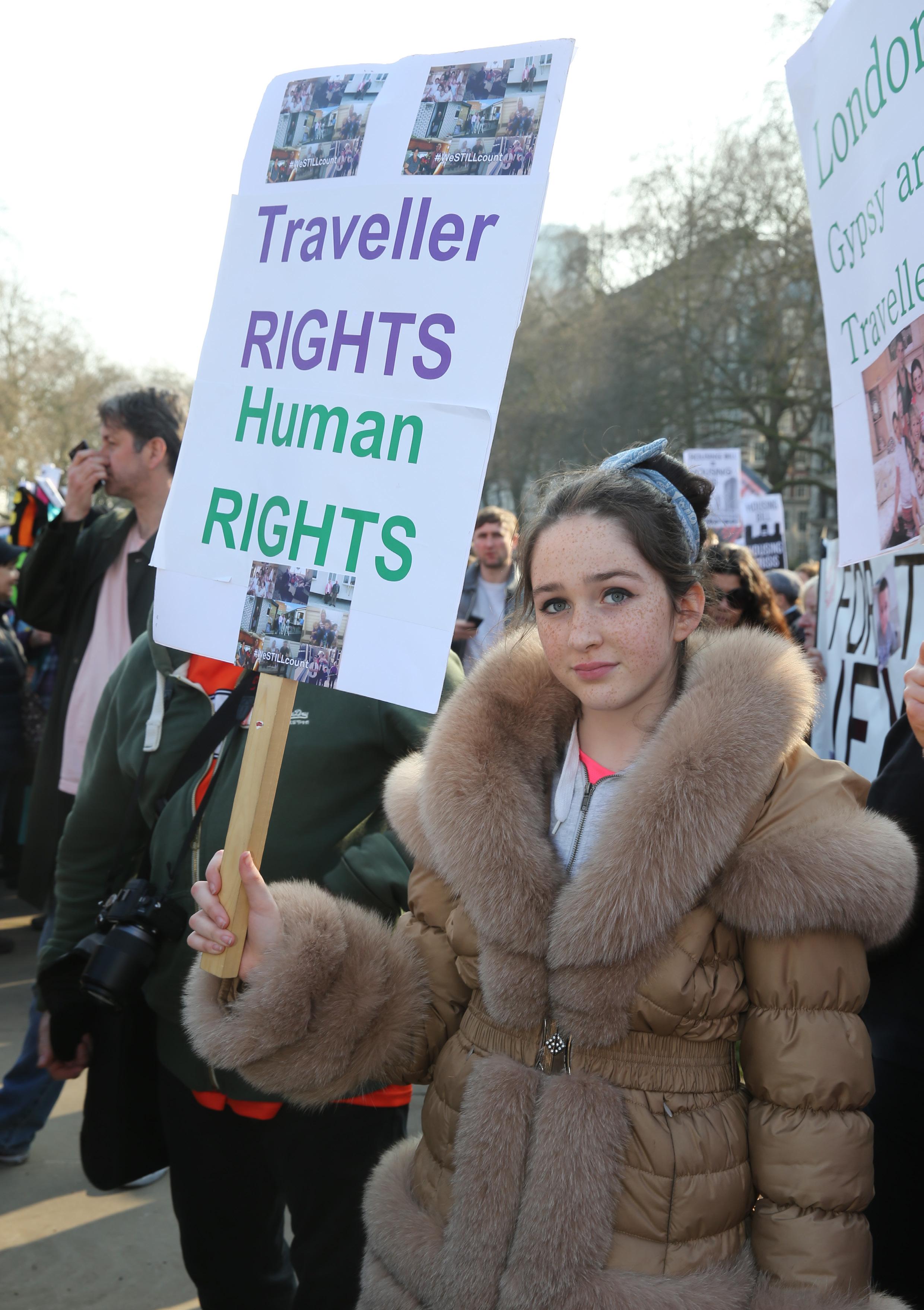

With the Trust for London funding we’ve been able to consolidate what we were doing to raise the voices and issues of our families, which was sporadic and opportunistic, into a more meaningful and thought-out piece of work. We’ve hived off our advocacy and campaigns lived experience group from our internal steering group, and renamed it Rights, Experience, Advocacy, Change (REACH).
We’ve been able to employ a mum to lead on this work, who’s been able to journey through most of the issues facing our families. Scaffolding and mentoring support has been put in place for her so that her work is trauma informed and takes account of power dynamics.
By sitting on panels, giving evidence to reports and working with the local authority on issues of children under five in Temporary Accomodation, we’ll be focussing on creating our first campaign around the issue of hotels with no cooking facilities used as emergency accommodation. The REACH team has already been recognised for its work through an ABFAB prize from the London Network of Nurses and Midwives.
£95,000
Funding for a project to create a shift in housing policy to tackle housing affordability. Positive Money will build building support among policy makers and politicians to adopt a new long- term housing affordability strategy to tackle the housing crisis, prior to the 2024 General and London Mayoral Elections.
£122,000
Funding for a community lawyer to undertake strategic litigation, specialising in planning and environmental law. This is to support grassroots groups and tenants & residents’ associations in Southwark, Newham and Barnet who campaign for regeneration projects that benefit the local community rather than private developers.
£150,000
The funding is for a campaign on behalf of TA tenants across Wandsworth and Croydon, working with the community to give them a public voice, in partnership with Citizens Advice Croydon. Alongside this SouthWest London Law Centres is taking on legal cases to help individuals, including some public law challenges.
£120,000
Funding for core costs to support work over the next three years. Work includes mapping and consolidating the role of lived experience in external advocacy work and internal governance and leadership, improving partnership work around the systemic issues and sharing learning and best practise on co-production and voice, and , 4. Scaffold their work by investing in casework and volunteer management capacity.
£90,000
Funding for two, part-time housing advisors to provide legal advice, support for people facing housing issues in private rental sector accommodation, who make up over 75% of WLEC’s housing enquiries. Services provided via drop-in, appointment at community surgeries and foodbank centres.
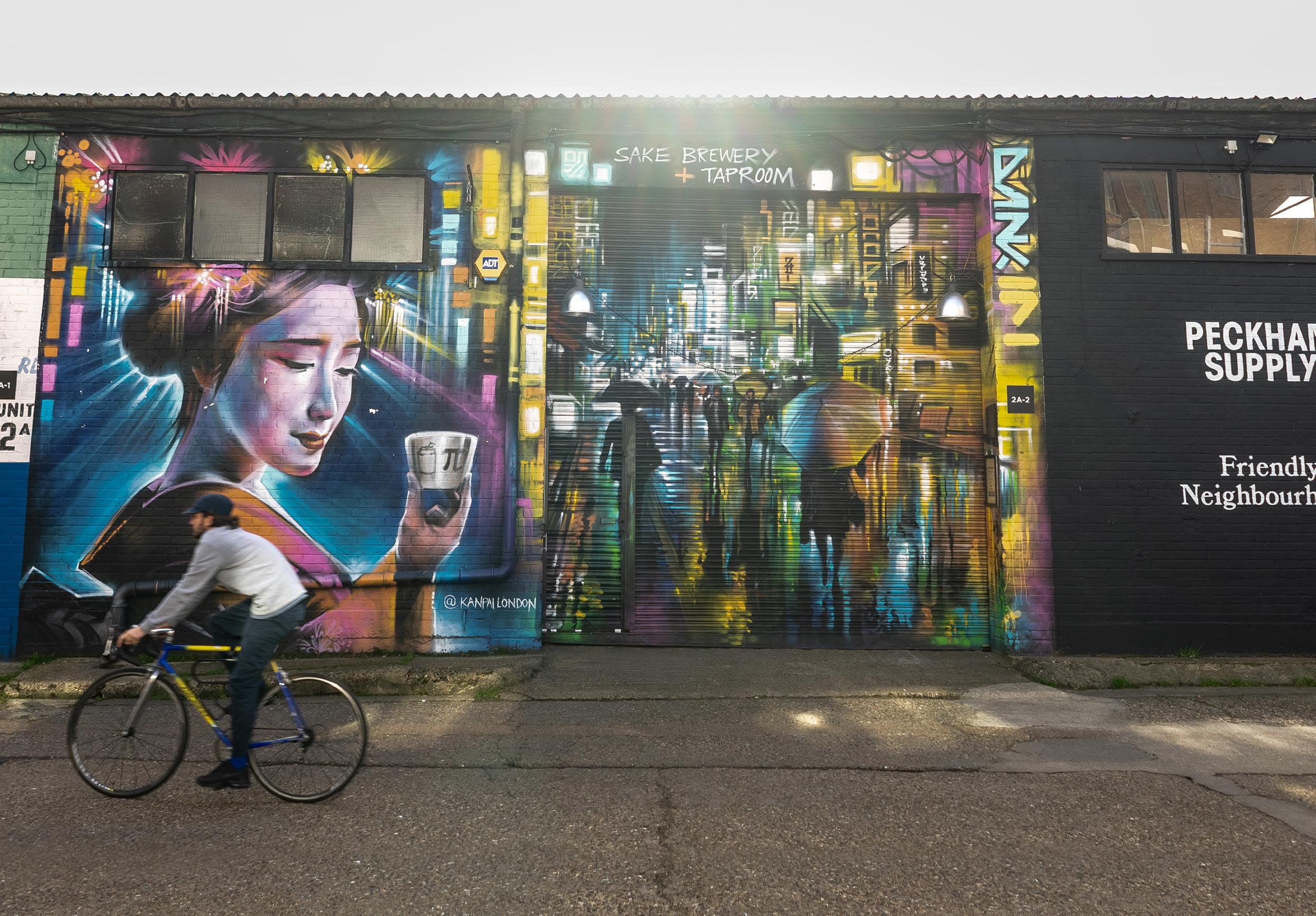
£132,000
Funding for a contribution to the costs of two solicitors over three years to provide specialist housing advice, training and holistic support for private rented sector matters that fall outside legal aid to improve young people’s ability to sustain tenancies.
£124,000
Funding is for the design and implementation of policy influencing and public campaigning activity that seeks to secure fundamental reform of TA practice in Westminster, making the most of the opportunity of a new administration in the borough.
49%
of Londoners in poverty are in employment
Paid work is crucial to tackling poverty. But many jobs are low paid, insecure, unrewarding and fail to act as a stepping-stone into a future career. Low pay and the abuse of rights is increasingly the norm in many industries. We want better work for everyone, where those in work are treated with decency, respect and paid at least a living wage.
We fund work that supports progression out of low-paid work, employment legal advice, advocacy and capacity and skills building.
Total amount awarded
£2.16m
Projects funded
17
We help victims cope with the emotional effects of Islamophobia. This can include fear, anxiety and stress. In some cases, the impact of Islamophobia is so severe that it can cause victims to change how they live their lives, often resulting in extreme fear of leaving their homes. This year alone, we have received over 50 reports of Islamophobia within London.

£115,000
Funding to support the core activities of the Moving on Up programme and step up ARE’s role in identifying and disseminating evidence of what works to improve employment outcomes for young black men in London. Also to provide the secretariat for the Newham Collective Impact Partnership.
£155,000
Funding is for a campaign director to focus on building the alliance, supporting the lead Organiser, recruiting allies to the alliance and scaling this work nationally.
£145,000
Funding for provision of employment legal advice, assistance and representation, on all aspects of employment law for people who live and work in Redbridge.
£100,000
Funding for providing employment advice to Wandsworth residents. Building the capacity of the London Citizens Advice network to increase employment advice provision by delivering a programme of training, support and quality assurance to cohorts of advisers across the network.
£175,000
Funding for an Employment Rights Project to provide specialist employment law advice, casework and representation for low-income individuals. The funding covers the salary and proportional on-costs for one, full-time specialist solicitor.
£87,000
Funding for the consolidation of the Better Work Project. As well as directly supporting people who have experienced homelessness to progress into better roles, the project works with employers to create systemic change, providing more progression opportunities for low paid workers within the hospitality industry.
£128,000
Funding for the London Progression Collaboration, which offers free business support to help create apprenticeships. This is developing a pilot for an intensive employer-facing support model throughout the apprenticeship lifespan, to improve progression opportunities for low-paid workers.
£160,000
Funding for a legal advice service for victims of religious and racial discrimination at work and/or as public service users. The funding covers the cost of IRU’s existing employment solicitor for the next three years, and/or funding to recruit an additional discrimination caseworker.
£145,000
Funding for the continuation and improvement of a programme of prevention, advice and evidencebased advocacy work. The work seeks to achieve improved working conditions, employment rights and enforcement for low paid migrant women workers through specialist support, and the engagement of women with lived experiences in evidence-based advocacy work.
£104,000
Funding for the continuation of policy and campaigning work to reduce pregnancy and maternity discrimination in the workplace, to strengthen legal protections for pregnant women and new mothers in precarious employment and to increase maternity pay and benefits.
£141,000
Funding for the support and salary of a senior employment caseworker and supporting costs to continue to meet the high demand of people seeking help in a range of employment matters from initial advice to written submissions, advocacy and representation in tribunals.
£101,250
Funding for a part-time employment caseworker for two years, providing free, specialist, advice, casework and Employment Tribunal advocacy to low paid, marginalised workers. Armed at addressing inequality issues at work, protecting workers’ rights, securing correct pay/benefits and obtaining redress/ compensation on wrongful termination.
£85,000
Funding for a data analyst and digital rights coordinator to build data trust, carry out targeted subject access request to help individual workers and to uncover greater transparency of algorithmic management.
South-West
£120,000
Funding for specialist employment advice, casework and representation through a mixture of free and feepaying services to work alongside and supplement the extensive pro bono clinic service.
£75,000
Funding for a full-time In-Work Progression (IWP) Worker, as an internal resource for teams supporting clients facing the dual hardship of insecure work and housing.
£250,000
Funding for a cohort of Justice First Fellows (JFFs) based in social welfare legal agencies specialising in addressing employment law needs in London.
£70,000
Funding for advocating for and supporting the career progression of individuals in low paid roles / with mental health issues to work that is better paid and more suited to their needs.

We advise pregnant women and new parents through our four advice services which are staffed by our in-house lawyers. Through our active programme of research, we campaign to end maternity discrimination, poverty and destitution amongst pregnant women and new mothers, and to reduce health inequalities.


We all need a safety-net during hard times. Help from the government can make a big difference to poverty levels. We want an inclusive and responsive welfare and support system that provides an adequate income for people when they need it. One that doesn’t create barriers or disincentives to working for those who can. Achieving a decent living standard is a particular challenge in London as so many costs are higher. Incomes need boosting, whether through wages or benefits, and costs must also come down.
£80,000
Funding a pilot/demonstration project delving deeper into the experiences of the women who receive support from Bloody Good Period, whose voices are severely under-represented in existing published work in this area.
£35,000
Funding a flagship strategic project on ‘Levelling up’, which is producing a rich programme of research and events, reshaping the national debate about levelling up and finding new ways of talking about London’s positive role in the agenda.
Total amount awarded £1.55m
Projects funded
16
£15,000
Funding to support organisations across London to host events and undertake activities during London Challenge Poverty Week 2022, with the aim of helping increase story-telling during in the week.
£82,000
Funding a new post of specialist benefits adviser (24 hours per week) providing clients with expert advice on challenges and appeals around benefits entitlements.
£89,000

Funding for a crisis navigator providing skilled advocacy/advisor services working flexibly across specialist areas of welfare benefits and housing. This role meets the welfare benefits and advice needs of the increasing number of residents with mounting debts to reduce poverty.
£165,000
Funding for actioning: (i) the latest phase of coproduction of the Commission on Social Security, influencing policy change in the field of social welfare (ii) influencing work on social security proposals (iii) three new deep-dive inquiries.
£159,500
Funding a full-time specialist Welfare Benefits
Caseworker for three years, providing specialist advice and representation on social security appeals to the First-tier Tribunal and Upper Tribunal. This is helping build capacity of other voluntary sector organisations through the provision of welfare benefits training and support.
£80,000
Funding is furthering work with disadvantaged young people at risk of homelessness through a Thought Leadership campaign. The campaign utilises the voices of London care leavers to determine the quality, scope and variety of financial education available from local authorities as part of the leaving care pathway.
With the funding provided by TFL, we have been able to offer significantly more assistance to those with benefit appeals and issues than we otherwise would have been able to – with this support, we have been able to help clients regain or obtain the benefits they are entitled to which has significantly improved their quality of life during these unpredictable times. More than the financial success, the increased specialism has enabled us to spend more time with the people we are helping – at a time where people are stressed, isolated, or vulnerable, the project allows us more time to understand them, making them feel respected and heard.
This is a crucial project funded by TFL, and is helping the vulnerable within our community to receive the assistance they need.

Thanks to the funding from Trust for London we were able to support many clients from diverse backgrounds. A majority of our client have dependants, like children, or older relatives they look after, so there are multiple beneficiaries impacted by the funding from TFL. This funding also allowed us to assist clients at a higher level of specialism. Clients who are supported by skilled advisers have much higher chance to be awarded correct benefit or achieve successful outcome at an appeal stage. We were able to literally change people’s lives for the better. We have assisted hundreds of clients, each of whom was supported to the greater degree than we would have been able without that financial help. Sometimes we simply helped to explain, organise and educate about complex benefit matters. Other times we were able to achieve big financial gains, by assisting with appeals. Each of the many ways we’ve helped, from listening ear to tribunal representation, made vulnerable clients’ better prepared to face costs of living crisis and improved their financial resilience. So whilst “changing people’s lives” sounds overly dramatic, on a day-to-day basis, this is exactly how it feels to many of our TFL- funded clients.
Thanks to TFL, we were able to achieve better results faster for our clients and their families.

£120,000
Funding for policy work to improve the rights of people living with HIV in London thereby reducing poverty and overcoming inequity. Developing a more current strategic communications work to reframe the narratives around HIV.
£110,000
Funding a transitioning services development coordinator, leading a multi-agency mapping/scoping exercise and needs assessment into transitioning services with sex workers. Results are shaping London transition support pathways and informing the policy changes to employment, Universal Credit, housing, and health, etc. necessary to achieving decent living standards.
£29,362
Funding research into the most effective ways to frame and message the Commission for Social Security’s proposals, for non-expert audiences, providing a concise and user-friendly summary of the findings and recommendations and subsequent support for up to six months as the Commission applies the recommendations to its ongoing communication.
£80,000
Funding for work with people with lived experience of childcare inequality in London, training and supporting them to document and share learning from community action childcare initiatives and campaigns. Storytelling to amplify the voices of people experiencing London’s childcare crisis and develops strategic communications around the issue.
£230,000
Funding is for legal work to assist the London sector to take a strategic legal approach to immigration and welfare rights issues.
£98,000
Funding work to build a stronger network of organisations to alleviate fuel poverty in Lambeth and London. The network is empowering residents as agents of social change through training, volunteering, employment and mentoring. It is also strengthening advocacy efforts, tackling causes and effects of fuel poverty at local, regional and national levels.
£150,000
Funding for ‘Access, Rights, Advice’, a scheme delivering transport sector system change and ensuring policies are directly influenced by disabled people and based on their needs. The scheme collates impactful data, develops Disabled people as agents of social change and campaigns for much needed structural reform.
£30,000
Funding a cost of living index for London which provides an understanding of how different Londoners experience changes in the cost of living. This is allowing the Trust and others to hold policymakers to account for improving living standards in London.

At Repowering London, we are increasing awareness and uptake of rights and protections for fuel poor energy consumers, so they have enough energy to meet the most basic needs of modern life.

Our volunteers design and conduct outreach activities within their own networks, such as parent groups and churches. They also contribute their invaluable perspective to our advocacy efforts, such as a helpful, ongoing relationship with Ofgem, the energy sector regulator.
Right now we’re learning from our volunteers and Community Leads, like EwureEsi Ansa Otu, involved in similar previous and ongoing projects. We want to embed all possible learning from across the organisation into this next phase of testing and scaling.
We involve people with direct experience of fuel poverty and/or mistreatment by energy suppliers right from the outset.
London is the most unequal region in the UK. Our capital has the highest rates of poverty, while being home to more billionaires than any other city. Inequality has been rising, as housing values have rocketed. There is a large gap between rich and poor. Even among those with wealth there is a huge gulf between the well-off and the super-rich. Inequality is bad for everyone, but particularly for those on low incomes. We want to see a fairer London. We fund advocacy work including campaigning, organising and policy work.
Our report, Parliamentary Estates, explored the extent of the property interests parliamentarians own and questioned whether this widespread conflict of interest could be affecting progress on the housing crisis. Transparency International UK brought these questions into the public domain, generating thoughtful coverage in the media and social media, raising awareness of the issue, and ensuring parliamentary questions in Westminster. Furthermore, our research highlighted the need for reform of how MPs’ interests are collected and published. Government is currently undergoing a technical review of how this could be achieved.

This research project includes interviews with HM Land Registry data on foreign ownership and a unique empty homes dataset to help us better understand how property investment coming from offshore tax havens impacts socio-economic inequality in London. The team published its report in November 2022, Tax Haven Money in London Real Estate. The report details purchases of London’s residential property between 1999 and 2022, by owners registered in offshore tax haven jurisdictions. It focuses on estimates of the scale of these flows and considers the social and demographic consequences of this type of capital flow.
This research project looks at the impact of Quantitative Easing (QE) and bank lending on price inflation and housing inequality in London. The team’s report Banking on Money, released in March 2022, examined why despite the economy still being in recovery from one of the worst economic contractions in 300 years, house prices have continued to soar. It found that the dominant narrative of the problem being rooted in a shortage of supply fails to explain the rapid house price growth of recent decades.
This project funds research, media and advocacy work to look at the impact of the capture of housing policy on London and its citizens, and how better safeguards and capture in the planning process in London can be put in place. The project report Parliamentary Estates, released in July 2022, examines the extent to which property interests permeate parliament.

London is an international city that attracts people from all over the world. Our capital, and our country, has a long history of migration, contributing to our rich and diverse history, and our wealth. Many new Londoners do not need any support, but some are disadvantaged and living in poverty. Migrants without legal status are particularly vulnerable to exploitation. We want all Londoners, new and established, to be able to participate fully in London life. We fund specialist legal advice and advocacy work.
Total amount awarded £2.64m
£100,000
Funding for specialist legal support for survivors of trafficking and modern slavery. Aims to protect survivors’ rights and minimise the negative impact of emerging immigration and modern slavery law and policy, through evidence based, survivor informed, systemic change focused on litigation, policy, influencing and campaigning work.
£73,000
Funding is for a thematic research project, addressing identified information gaps for particularly vulnerable groups of asylum seekers in London and across the UK.
Projects funded
26
£105,000
Funding for legal representation for destitute asylum seekers trying to access housing and financial support,advocacy to improve the provision of temporary accommodation for asylum seekers, and work to improve the skills of second tier organisations, sharing best practice on asylum support and increasing policy influence.
£150,000
Funding for a full-time immigration lawyer to provide advice and representation to London based clients detained under immigration powers in bail and deportation matters. Including assistance through self-help literature, outreach and the provision of highquality training and supervision of legally qualified volunteers.
£120,000
Funding for the delivery of free legal advice and representation up to Level 3 for vulnerable migrant families, children and adults and to gather evidence and build a network and referral process to increase the supply of free legal advice within London.
£152,220
Funding for KINDUK - a collaboration between notfor-profits and law firms, who in turn represent in children’s immigration cases. KINDUK also promotes Implementation of a child-rights framework for local authorities/governmental institutions interacting with children.

We were delighted to be awarded a 3 year multiyear grant for our free immigration service in 2022 from Trust for London.
The most problematic barrier to secure housing and employment can stem from an individual’s immigration status. Without Leave to Remain in the UK, individuals and children can stay trapped in poverty and vulnerable to exploitation and abuse.
Accredited by the Legal Aid Agency and the Office of the Immigration Service Commissioner, the Centre’s immigration team primarily helps undocumented migrants - people who may have lived in the UK for years but have no right to work or benefit support, a bank account or to receive NHS treatment other than for emergencies. It also helps refugees with asylum claims.
Thanks to the Trust for London grant in 2022, we achieved life changing outcomes for 115 Londoners and their families which included:
• Achieving fee waivers for 38 clients (fees of over £1,000 per application are unaffordable for our clients)
• Indefinite Leave to remain for 16 clients
• Extended Leave to remain for 28 clients
• Gaining recourse to public funds for 51 clients.
The war in Ukraine hit our organisation particularly hard. Here at EERC we all are Eastern European, so immediately extending support to our neighbours in Ukraine was an imperative. In a very timely manner Trust for London awarded us a grant to provide immigration advice, assistance and outreach. This funding, together with emergency funds from other funders, allowed us to provide help to over 200 Ukrainian evacuees in London so far.
£100,000
Funding for an integrated advocacy programme aimed at achieving a statutory prohibition on indefinite immigration detention, reforming the UK’s deportation policies, and fundamental and widespread reform of the asylum system, with those with lived experience of these systems at the heart of the work.

£75,000
Funding for Doctors of the World (DOTW) to build on existing lived experience initiatives, scaling up co-production work through meaningful engagement mechanisms that contribute to agenda setting and decision making.
£150,000
Funding for the costs of the immigration programme staff. One full-time OISC Level 2 adviser and part-time OISC Level 3 immigration solicitor. delivering specialist immigration advice and representation - 120 users per year immigration outreach information campaign50,000 users per year.
£35,000
Funding for a secondment of an EERC staff member to the GLA’s social integration team to develop new work on tackling migrant exploitation in the workplace.
Haringey Migrant Support Centre
£143,000
Funding for continuation of HMSC’s current partnership with Islington Law Centre and expansion of HMSC’s inhouse immigration advice capacity. Enabling HMSC’s visitors to regularise immigration status, securing the right to work and access housing and welfare support.
Harrow Law Centre
£100,000
Funding for part of the salary of a full time Immigration solicitor.
£20,000
Funding for work to create referral partners with resettlement programmes and organisations - Syrian, Afghan, Hong Kong and Ukrainian - and to make 150200 matches for those rebuilding their lives in London.
£180,000
Funding for a legal helpline for undocumented migrants and their families, outreach work with the Red Cross, and to analysing macro- and case-level data to inform advocacy, media and campaign work.
£199,500
Funding for JfKL’s holistic representation of young people through the continuing provision of specialist immigration (non-asylum) legal support across London. Evidence from the casework is used to fight for reform through influencing and campaigning to achieve a more humane, just and fair immigration system.
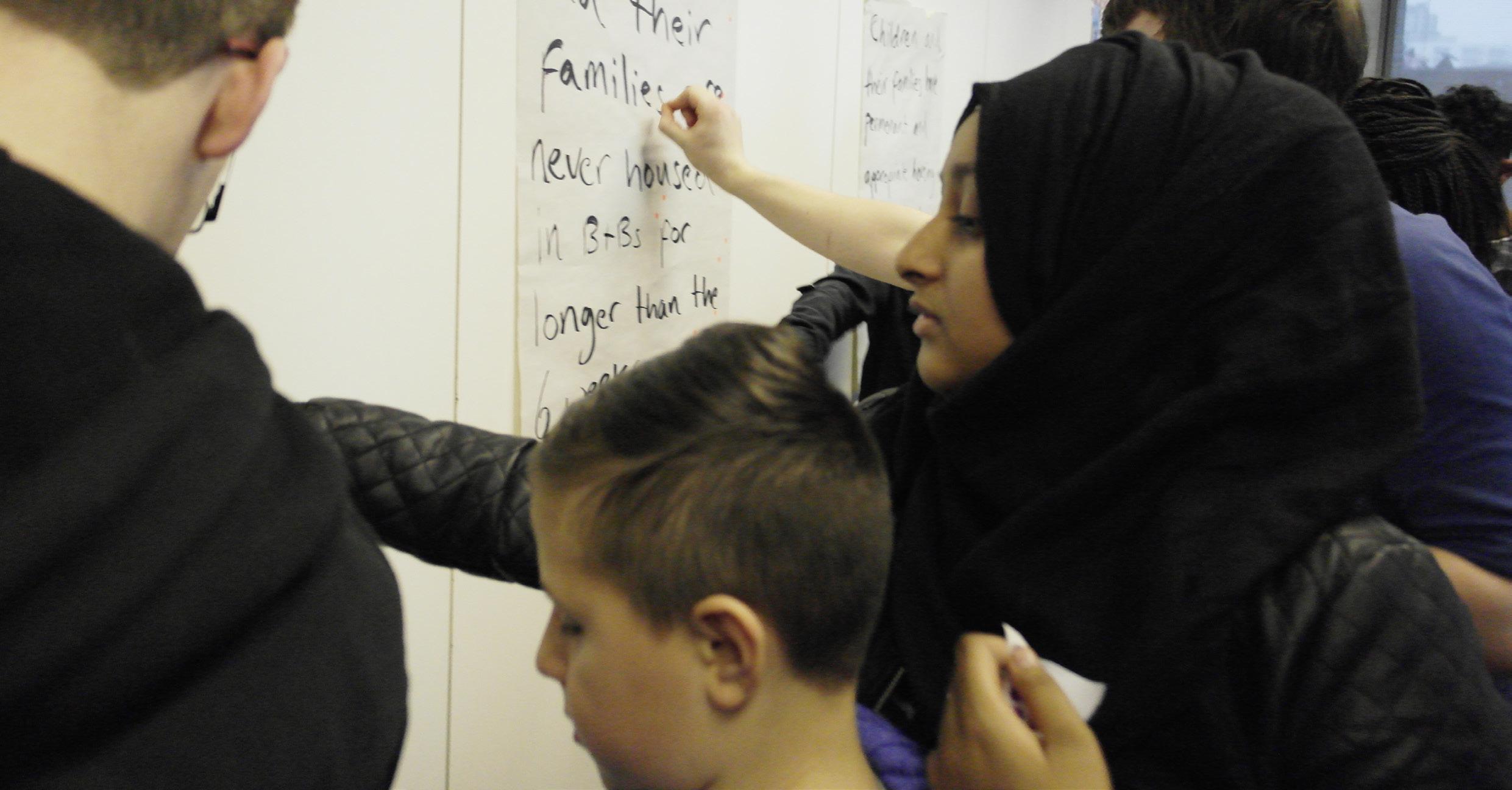
£90,500
Funding for support and campaign work for undocumented Filipino migrants in London, to increase chances of regularisation through free immigration advice, better information about rights, and participation in campaigning.
£35,000
Funding for a seconded person to the GLA, recruitment of a trustee and core and management costs.
£125,000
Funding to cover the costs of a policy, research & parliamentary manager to lead on work to challenge harmful Home Office policies, and disseminating medical evidence and research.
£145,000
Funding for three years for an OISC level 3 senior advice worker to manage the advice service, ensuring vulnerable asylum seekers and refugees are reached, liaising with partner agencies and influencing policy.
£78,000
Funding for specialist immigration legal advice and advocacy work that results in improved access to justice, rights and protections for migrant women vulnerable due to insecure immigration status and are experiencing or at risk of Violence Against Women and Girls (VAWG).
£100,000
Funding for advocacy and campaigning to increase public and political support for safe routes for refugees to the UK. Covering the salary costs of a public affairs and policy manager and costs associated with enabling young refugees to campaign for systemic change.
£135,000
Funding for delivery of specialist housing casework for destitute migrants in Southeast London to reduce homelessness and poverty. Providing second tier advice and training for frontline workers to build capacity to refer destitute migrants to sources of advice, and coordination of the Housing and Immigration Group (HIG)
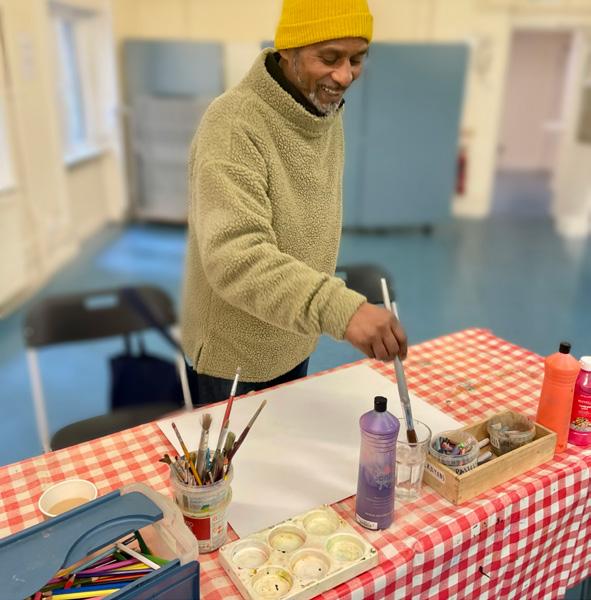
£10,000
Funding for the All Party Parliamentary Group for Migration to work with a group of civil society experts to conduct an inquiry into the impact of the EU Settled Status scheme roll out, and to make policy recommendations based on their findings.
£85,000
The funding is for an OISC Level 3 immigration lawyer, who will supervise the casework of TUP’s Level 1 caseworkers to carry out our advice work. The current L3 advisor works on average 4 hours p/w on a freelance basis and the organisation has the necessary accreditation and insurance.
£90,000
Funding for the Chasing Status Project as it implements, disseminates and activates the June 2022 legislative changes to the ten-year route to settlement. It hopes to have a hyperlocal focus so young people and their families across London are aware of their rights and entitlements.
£44,600
Funding to support the Ukrainian community through advice and casework on immigration, job searching, employment rights and welfare benefits. Financing the full-time salary of an experienced Ukrainian and Russian speaking adviser, expanding capacity to deal with the growing volume and complexity of queries.

Over the past year our immigration advisers have been able to assist 43 London-based destitute undocumented migrants to regularise their stay in the UK, including some through the appeal process, 35 of which were given fee waivers. They have registered children of undocumented families as British citizens, resulting in the regularisation of the other family members. Our team also continue to assist in family reunions by bringing families of refugees to the UK, as well as refugee settlement applications.


Small community groups make a significant contribution to improving the lives of people and communities in London. They often do this by providing support for people to access their rights and entitlements, and to speak out about issues that directly affect them. This funding is for groups with incomes under £300,000 a year, and focuses on campaigning and advice work.
Total amount awarded £1.97m
Projects funded
29
AFRIDAC is determined to build an army of Community Advocates who are equipped to amplify the voice of their community and effect social change at a local level.
Thanks to the funding from Trust for London, we have been able to train and mentor 12 Black Community Advocates. Another cohort of 18 Black Community Advocates will graduate this August.

£119,000
The funding is for the provision of a comprehensive advice, information and advocacy services to the community on a wide range of issues. Helping the Afghan community access provisions including welfare benefits, housing, health and immigration. To make sure they understand a complicated and unfamiliar system and to access provisions.
£69,608
The funding will allow AFRIDAC to provide 5 days blended advocacy training and mentoring for 30 Community Advocates over 3 years in London. Increased advocacy skill will amplify the voice of the African community to influence social change, tackle poverty and inequality. Funding will enhance AFRIDAC existing digital channels.
£80,000
The funding is for staff and resources to support people with learning difficulties in speaking out and raising awareness of local services and organisations of what they need to do to improve inclusion with the goal of achieving greater levels of involvement and integration in the community.
£60,000
The funding is for a part-time Welfare Benefits Officer to provide support regarding accessing benefits, rent arrears, utilities, benefit entitlement, housing issues to 300 disadvantaged and excluded people from Somali / BAMER communities in Barnet over three years.
£56,230
The funding is for the salary for a part time advice worker (2.5 days a week), who will provide advice and support to our service users, support staff in running workshops and group activities and will do home visits to assist housebound service users.
£56,033
This funding is for “Independent Futures” CTG-UK will provide welfare benefits, housing and general advice to Tigrayans living in poverty within Lambeth. A key focus will be collaborations with health and specialist services e.g. GP’s, debt advisors etc. and 1-1 case to improve beneficiaries’ quality of life.
£25,000
The funding is to amplify the views of Islington’s very diverse local communities and those in housing need, so they are taken into account by decision makers, ensuring these views are at the forefront of the redevelopment of the Holloway site during final planning, demolition and construction.
£63,000
The funding is for a programme of work called ‘Empowering Rights for Women’. This will inform Deaf ethnic women of their rights, and how to exercise them in full by offering fully accessible and culturally sensitive workshops and one to one drop in sessions.
£125,000
The funding is for a continuation of advice and advocacy service which aims to ensure that disadvantaged members of the local community are able to access the necessary information and advice through 1-2-1 and virtually support and monthly workshops by professionals and advocates.
£28,000
The funding is for the rent for Sylvia’s Corner, to sustain our campaigning base. As a volunteer-led organisation, funding is also needed for campaign materials, phones, computers, travel costs, childcare, training support, with the aim of improving access for as many people as possible to the campaign.
£33,700
The funding is for targeted outreach work with BAME, LGBTQ+, young men, disabled people, and people with other protected characteristics, to build representation leadership. This work will lead to direct engagement of people with lived experienced of mental health in coproducing, co-designing and influencing local mental health decisions.
£50,000
The funding is for increasing the coordinator’s hours to enable Harlesden Neighbourhood Forum to become more engaged in the community and local council initiatives. The support will enable the development of a growth plan, delivering the capacity and resilience needed to combat local poverty and inequality.

£76,500
The funding is for continuation support for our successful two days a week advice and advocacy project for Somali and Arabic speakers from across North London. Clients are supported with crisis assistance, debt, welfare benefits, help into employment, housing advocacy, health, and training to reduce the cycle of crisis.
£40,000
This funding is for the provision of welfare advice/ guidance support and services to the lonely and vulnerable in the local community, especially those from the Asian community as well as other ethnic minorities.

The impact of the project funds was nothing short of transformative, as it empowered us to allocate additional resources towards our mission. With this funding, we were able to recruit a dedicated advice and advocacy worker, amplifying our efforts in serving the community.
The funding allowed us to bridge language barriers by further supporting Somali and Arabic speakers from across North West London. This invaluable resource enabled effective communication and ensured that our clients felt understood and supported on a deeply personal level.
With these enhanced resources at our disposal, we were able to provide comprehensive assistance to our clients. From crisis intervention and debt management to welfare benefits, employment support, housing advocacy, and holistic health and training initiatives, we addressed the diverse needs of those we served. By breaking the cycle of crisis, we empowered individuals to improve their living standards and fostered their integration within Harrow and North West London.
The grant not only provided a financial boost but also facilitated the establishment of an empowering advice, guidance, and advocacy service within the Borough. This initiative directly benefited 450 clients through drop-ins and outreach support over the course of the last 12 months.
We are immensely grateful for the ongoing support that the funding has provided. It has enabled us to make a lasting impact in the lives of those we serve, and we remain committed to leveraging these additional resources to continue making a positive difference in our community.

The Queer Leaders Forum provides a physical space at The Outside Project LGBTIQ+ Centre for organisers to meet, run groups, try new ideas and get peer and professional support from LGBTIQ+ people who have experienced the same struggles in starting new projects in a small, underfunded and relatively new sector.
Given our shared experiences we’re very proud to be able to offer safe, accessible space and advice and partnership without asking for anything in return. Some previous members we still hear from when they need help with a grant application or a policy - the boring admin - we don’t charge them a fee, expect any mention of our support or take any ownership of their journey and achievements.
We are supporting people entering the LGBTIQ+ sector in London who are from more marginalised LGBTIQ+ backgrounds out of solidarity. The impact we love to see is ‘by and for AND…’ leaders succeeding in a world designed for us to fail. This is important for us as our founders and crew are predominantly working class, exhomeless, trans and neurodiverse. We don’t see many LGBTIQ+ organisations led by people who look like us and equally we won’t get a seat at the table unless there are more like us.
£114,000
The funding is for the salary of the Welfare and Housing Advisor and associated costs over 3 years to help 720 (240 per year) vulnerable Iranian and Farsi speaking refugees/migrants reduce financial hardship and isolation. A further 40 people per year will improve their understanding of welfare benefits in relevant workshops.
£67,000
The funding is for the sustainability of the KCA Advice service, which is soon to reach formal external AQS accreditation.
£50,000
The funding is to continue our weekly forum - London Queer Leaders Forum (QLF) - within our LGBTIQ+ Centre. The forum provides online, in person and outdoor group sessions and will be facilitated by the Outside Projects Managing Director and the LGBT Consortium’s London Coordinator.
£49,000
The funding is for two part-time advisors to support Bengali and other ethnic minority groups in the community. This is to support access to welfare benefits, health and social services and schooling.
£72,500
The funding is for a community advice and outreach service embedded in a public square in Dalston, which is frequented by a marginalised and excluded community that does not engage with formal services. The assistance is user-led and offers practical help with accessing benefits, housing and other welfare support.
£75,089
The funding is for providing quality information, advice and guidance on welfare and housing related issues to the Somali community in Haringey. RISE want to enable Haringey residents to have a knowledge base of their rights and entitlements, and where possible signpost to pre-empt problems before they escalate.
£80,000
The funding is for: Outreach advice services – bringing advice to the community Outreach advice surgeries Street outreach, day or night shelter advice, Telephone advice and digital platform support, Advocacy and casework Referrals and signposting, Home visits Mc Kenzie friend service at tribunal, court hearings, client panel representation.
£79,419
The funding is for RWA to continue supporting refugee, asylum seeking and migrant women by providing essential advice, advocacy and support and to do this they need to increase staff capacity and increase staff hours of work so that they can could IAG and training & deliver essential services.

£80,000
The funding is for a dedicated part time (14 hours) welfare advice worker and a specialist debt advice service aimed at strengthening the financial resilience through a holistic approach to users’ needs that includes welfare and wellbeing support, accessible appointments system, money and debt advice and basic needs support.
£82,000
This funding is to contribute towards the costs of Employment & Learning coordinator to advise and support those suffering from disadvantage in the Kilburn area with benefits, housing, form filling, childcare, training, using digital resources and to co-ordinate volunteers trained in basic IAG and signposting.
£30,000
This funding is for a quality assured (Face-to-face and Telephone based) social welfare and benefits advice service, targeting Black, Asian minority communities, especially those of Tamil heritage, living in Greater London. The bilingual service will be provided five days a week, from 9.30am-4.30pm and will be free at the point of access.
£80,000
The funding is for developing and delivering a programme that educates and empowers Tenants and Residents Associations to be able to deal with issues surrounding social housing through a series of round table discussions, workshops, and broadcasts. Funding will cover salary for a leading officer, training, equipment, and management cost.
£80,000
The funding is for SRCF work to strengthen refugee and migrant voices through establishing and supporting a panel of Experts by Experience. Information collated and issues raised by SDCAS’s advice sessions and Experts by Experience panel will inform inter-agency forum meetings hosted by SRCF with the aim of effecting policy and practice change.
£90,000
This funding is for 1 FTE qualified debt advice Case Manager. This will (a) support existing capacity, particularly in East Hounslow through our network partner, where demand is growing and (b) increase our capacity across our service area by sourcing additional case manager hours.
£60,000
The funding is for a two-year project that will enable us to offer free family support and advice services to vulnerable Eastern Europeans and recruit and develop a cohort of 10 community volunteers who will step into paid employment after completing their placement with us.
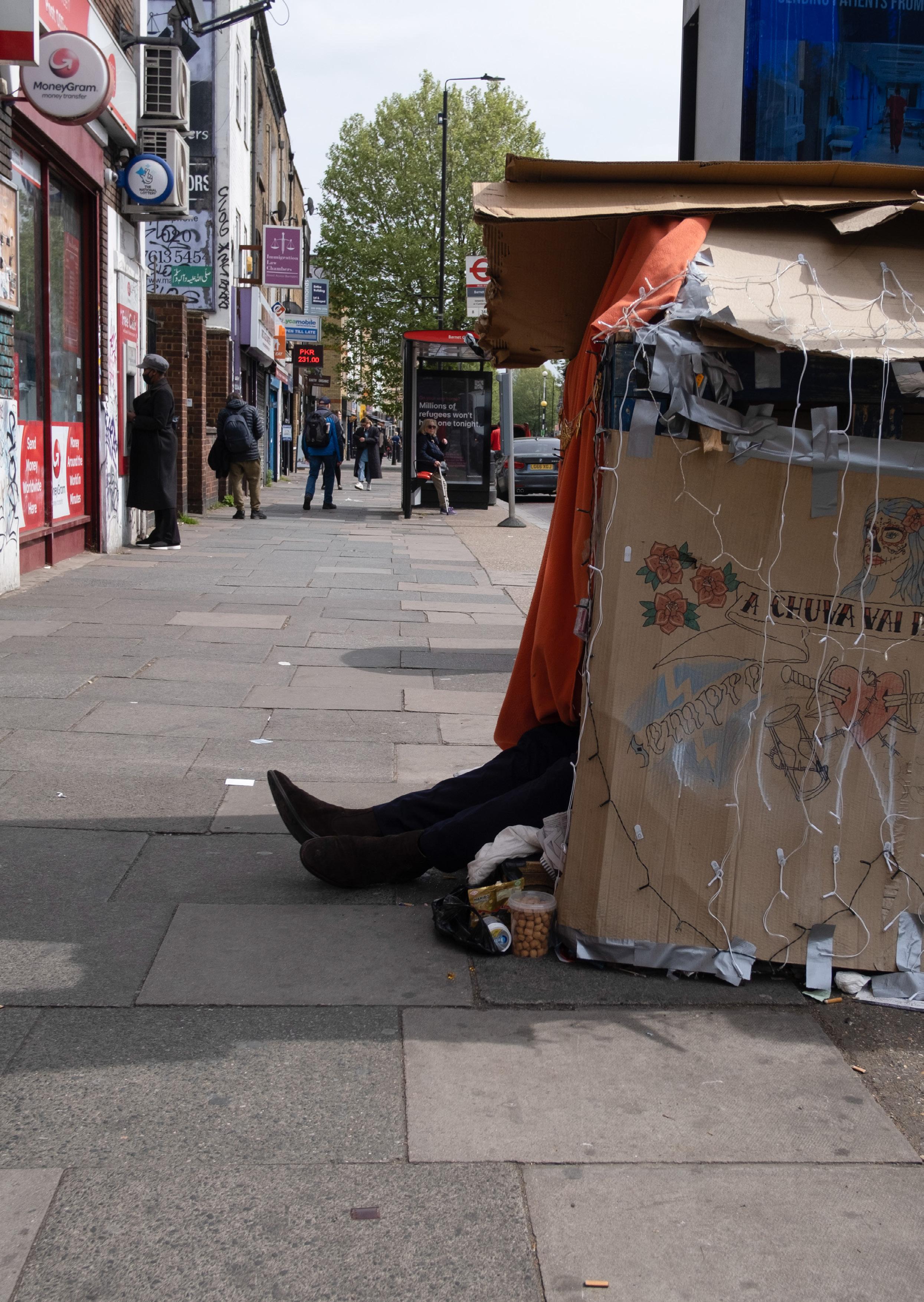
Civil society has a long tradition of advocating for social change, and that has led to great progress. We want to keep supporting people to build the skills to influence government, policy-makers, media and the general public, in order to tackle the root causes of poverty and inequality.
The skills we believe are crucial are campaigning, community organising, gathering evidence and strategic communications. Central to this is the amplification of the voices of those experiencing the problems first hand. Development of strategic communications is also critical. Too often the messages we use do not connect with the audiences we are trying to reach. Sometimes they even damage the causes we are supporting.
Better understanding of public attitudes on the issues outlined in our funding programmes is also vital, and we are working to improve skills in this field. This can also look like work that enhances the capacity of civil society to influence policy and decision making in our priority areas.
Total amount awarded £1.16m
Projects funded
9


When the world around us seems chaotic and unjust, what gives us hope at Sounddelivery Media is the unwavering commitment and dedication of our network of leaders using their lived experiences to create a fairer, more equitable society for their communities. They show strength in the face of challenges that may seem insurmountable, where systems have failed them. As allies we have been given the role to step up to provide the support they need to be listened to and to be able to take action. It’s not one we take for granted or lightly. It comes with a huge responsibility. Being able to run our Spokesperson Programme and our wider work with people addressing social injustice, is a privilege. We are guided by and learn from them. A programme that began as an initiative crowdfunded from our community to create a network of media confident leaders, has become so much more as with increased confidence, skills and, importantly, visibility they find themselves in places where they are influencing policy and practice. The positive support from our network of funders has enabled us to create a special, unique kind of leadership programme that we are extremely proud of.
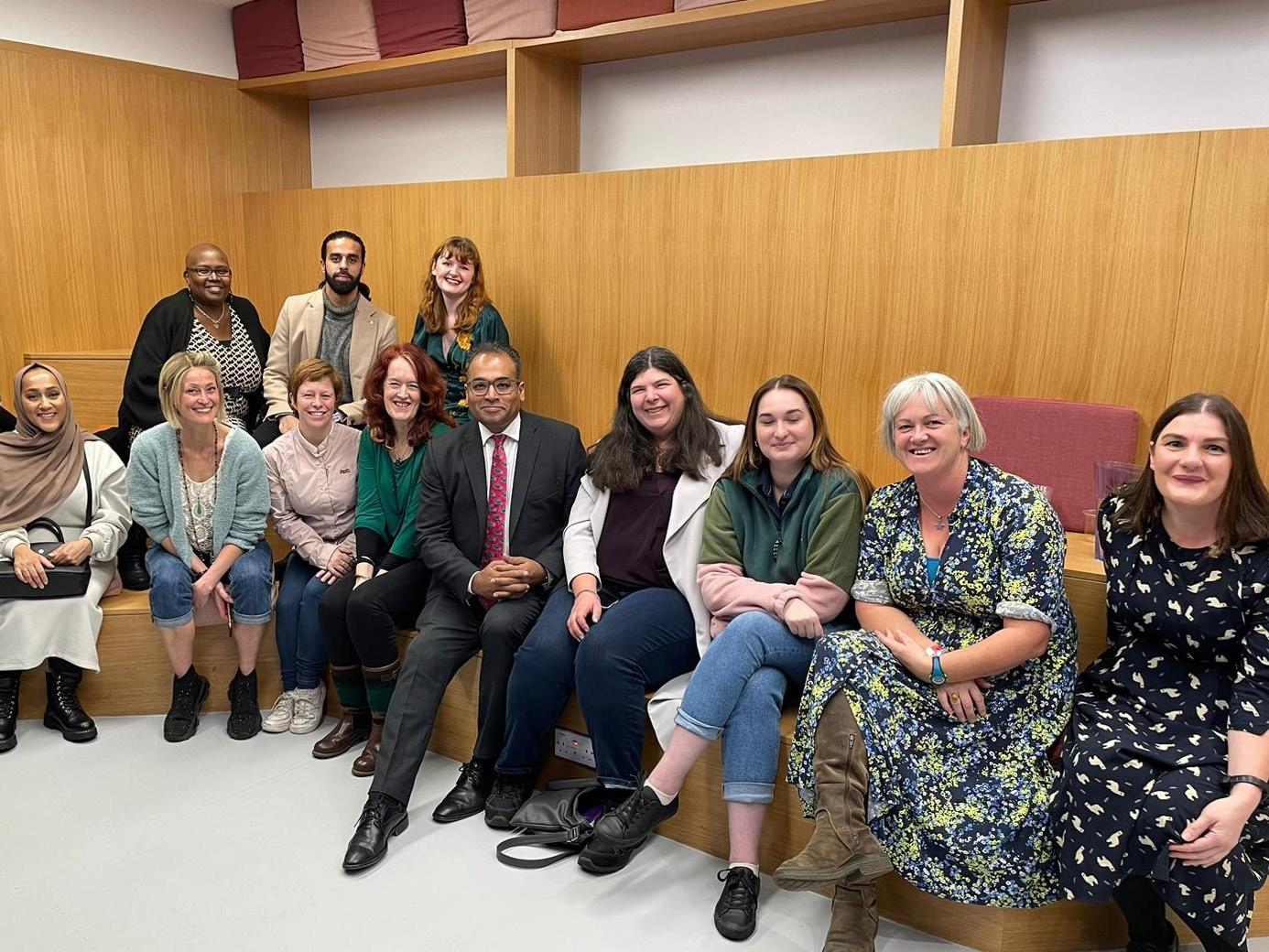
£77,382
The funding is to develop the work of North Hackney Neighbourhood Alliance (NHNA) to bring systematic and institutional change in our neighbourhoods. To employ an experienced community organiser and project manager to enable people with lived experience to participate in resolving issues related to poverty and powerlessness.
£160,000
The funding is for strengthening the voices of London’s civil society through an evidence-based and accessible strategic communications programme. It will equip organisations with the knowledge, skills, confidence and connections they need to use this powerful approach to help make a reality of equality and social justice in people’s lives.

£75,000
The funding is for the GLF infrastructure and coordination (via a part time Coordinator and running costs) necessary to make the voice of older Londoner ‘as loud, inclusive and articulate as possible’ - to push for implementation of a truly ‘Age friendly London’ and Age-friendly recovery from C19.
£249,000
The funding is for building the capacity of London Deaf and Disabled peoples Organisations (DDPOs) to collectively influence local, regional and national policy making so that the priority inequality and poverty needs and issues affecting Deaf/Disabled Londoners are better addressed.
Young Londoners are facing an unprecedented cost of living crisis, with a lack of affordable housing and increasing prices of everyday essentials. Despite this, they have aspirations, personal and professional, that they want to achieve to have a meaningful and fulfilling life. There is an urgent need to tackle the barriers to these aspirations, and make London a better city to live in for young Londoners. We will be developing policy solutions designed with peer researchers focusing on how peer research with young people can shape policy and practice across London.
£140,000
The funding is for the salary of the Community Development Manager and for running costs. The purpose will be to directly work with a range of local stakeholders to strengthen the capacity and skills of residents and organisations to collectively respond to local challenges and influence decision making.
£102,000
The funding is for building the capacity, resilience and strategic impact of London based civil society groups, creating opportunities for support for those with lived experience of the issues they work on to become leaders on those issues, within movements and in the media.
£105,000
This funding is for engaging older people from all sections of the LGBTQ+ community in researching the intersectionality of multiple inequalities experienced by older LGBTQ+ people and their long-term impact on poverty and disadvantage, increasing their voice and ability to campaign and advocate for policy change and improved decision making.
£167,200
The funding is for strengthening young people’s voices in policy and practice across London, ensuring that recovery post-COVID19 is inclusive and equitable. Young people will co-design and co-deliver research and campaigns, with the Youth Sector. PYF will work with the young people, to develop their skills on participatory research.
£82,000
The funding is for a Network Media Manager role for two years, supporting two new cohorts (28 leaders with lived experience), continuing support for SDM’s previous two cohorts (24 alumni), to amplify their voices on social inequalities and lead a ‘community of practice’ to share learning within the charity sector.

We provide social investment to charities and social enterprises based in London that are looking grow and become more sustainable.
Under our social investment programme, we aim to:
• Help move frontline organisations and enterprises that are tackling poverty and inequality towards longer-term sustainability
• To continue to demonstrate that social investments can offer good financial returns whilst also achieving positive social outcomes
Big Creative Training
£589,000
BCT college offers courses for disadvantaged young people and those not engaged in education. It also offers access to opportunities in the creative and cultural industries such as games design, film, fashion, music & performing arts. Funding made to refinance an existing high interest loan for a trading enterprise that offers affordable workspace and training and job opportunities to graduates from the college.
Branches
£300,000
Support for single homeless people in the Waltham Forest area. The investment is for purchase costs of a building that will provide move-on accommodation for clients of the existing shelter known as 'Branches' and allow support of more individuals.
Total amount committed
£3.38m
Projects funded
6
Growth Impact Fund
£500,000
A social investment fund managed by Unltd and Big Issue Invest to provide patient and flexible capital to organisations tackling inequality in the UK. It aims to make at least 50% of its investments to diverse led organisations, with all investees supported to improve their policies and practices regarding equity, diversity, and inclusion.
London Capital Credit Union
£120,000
LCCU is a London-based credit union established in 2000. Our investment was to support the expansion of the capital base to enable it to lend to a larger number of borrowers, particularly from low-income households.
£1,122,000
One of the largest and most successful Social Enterprises, using a cross subsidised model to provide affordable childcare. Our investment enabled them to open a brand-new purpose-built nursery at the Reach in West Thamesmead – bringing jobs and high-quality Early Years Education and Care to the local community.
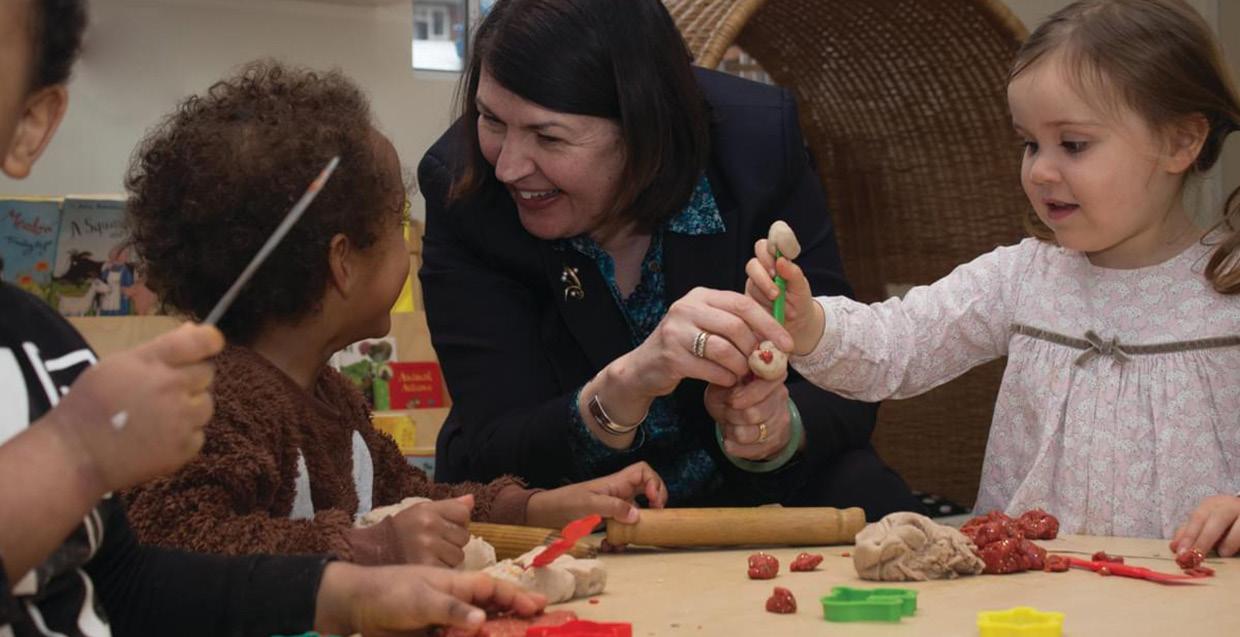
£750,000
A loan to establish a revolving loan fund, which will be used to install renewable-energy assets and triple London’s community-owned solar electricity generating capacity to 5MW.
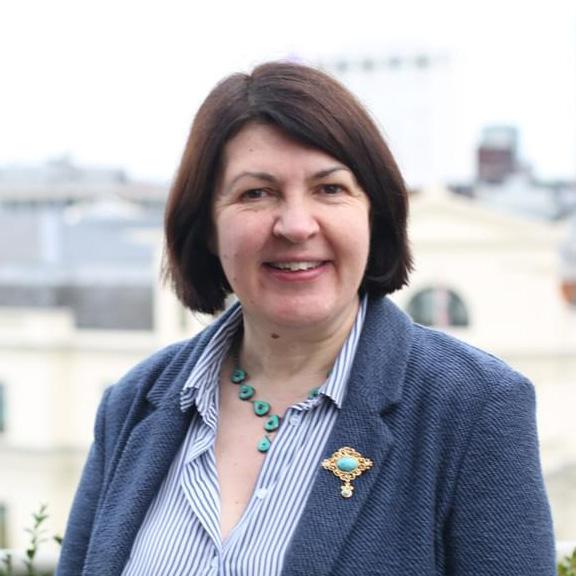
We’re delighted to be opening our second LEYF nursery in the borough of Greenwich, providing parents with access to highquality education and childcare and support them to work.
Our social enterprise model and pedagogy, underpinned by an ethos of inclusion, equality and empathy helps boosts children’s learning, particularly in areas which are underserved by the childcare system.
With support from organisations like Trust for London we can make this happen even faster for the families that need it the most.
The objectives of the Central Fund are any charitable purposes, other than the advancement of religion, which are directed to the benefit of poor inhabitants in the area of benefit. The Central Fund aims to reduce poverty and inequality in London through grant making to the voluntary and community sector and others, as well as by using its own expertise and knowledge to support work that tackles poverty and its root causes. The Trust considers that the relief and prevention of poverty is of public benefit to all.
The objectives of the City Church Fund are the advancement of religion for the benefit of the public in accordance with the doctrines of the Church of England; the repair, restoration and maintenance or preservation of churches; the augmentation of clerical stipends; and the giving of theological instruction to persons preparing for Holy Orders.
The purposes to which the City Church Fund has to be applied are essentially religious. The monies have to be distributed in the following proportions: one third is given to the City churches within the City of London and two thirds to the six Dioceses of the Church of England, in whole or in part within the area of benefit, in such proportions as are determined by the Church Commissioners.
The Trustee confirms that it has had regard to the guidance contained in the Charity Commission’s general guidance on public benefit when reviewing the Trust’s aims and objectives and in planning future activities and setting the grant making policy for the year.
Trust for London does not undertake any fundraising activities and does not use any professional fundraisers or ‘commercial participators’ or any third parties to solicit donations. We are therefore not subject to any regulatory scheme or relevant codes of practice. We have not received any complaints in the current or prior year in relation to fundraising activities, nor do we consider it necessary to design specific procedures to monitor such activities in the current year or in the prior year.
Whilst 2022 saw us responding to the immediate needs of the cost-of-living crisis, 2023 will be a year of planning for how we address the challenges that await London until 2030. Our 2030 funding strategy will build upon the strengths of our current strategy, and maintain our combination of meeting the immediate needs of low-income Londoners, whilst trying to change the underlying causes of these needs. The strategy will launch in the first quarter of 2024.
Alongside our new strategy, we will refresh our organisational values. As an organisation we have a strong, implicit sense of who we are, but we have not always articulated it. We now need to be more explicit about our values, in the hope that they can guide our actions as we continue to evolve.
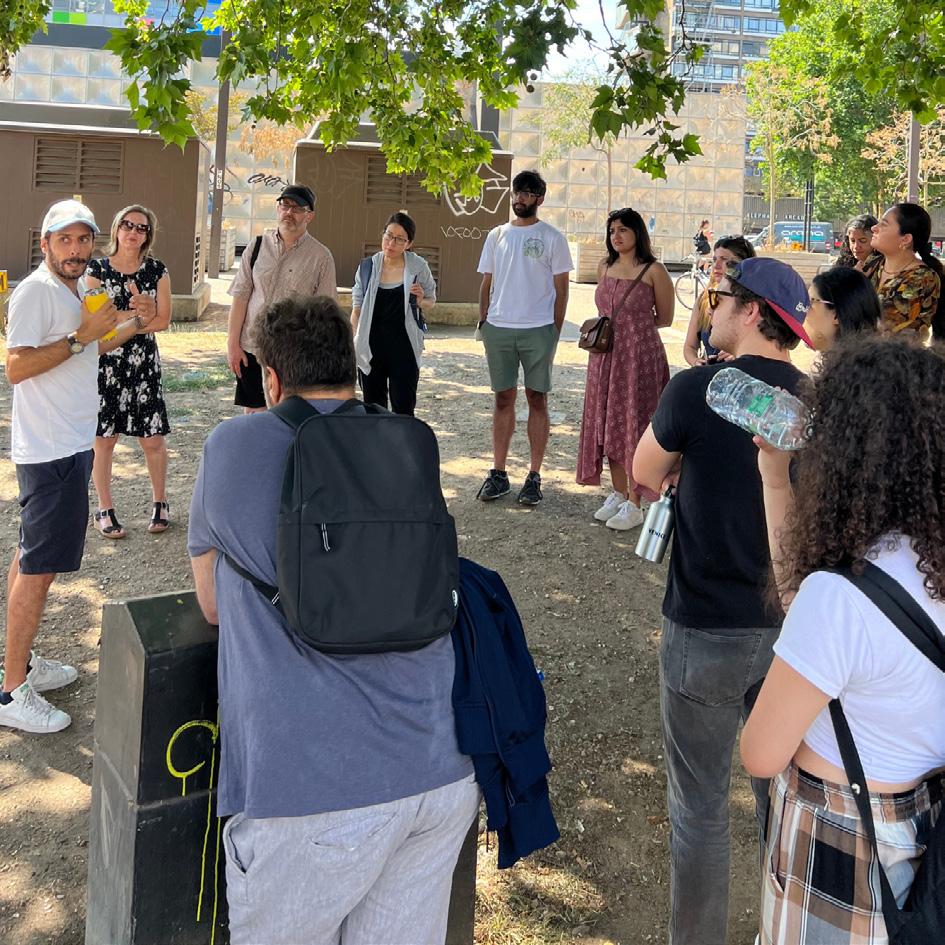

2023 will see us continue to improve our core business systems, including embedding Salesforce as our new database, and implementing XLedger as our new finance system, enabling us to be more efficient in our financial operations.
Finally, we expect 2023 to continue to be a busy year for distributing funding. Our Disability Justice Fund and Racial Justice Fund will be active throughout the year. And, whilst we will not run our traditional open funding rounds, we will distribute funding to organisations that we are already supporting, ensuring their vital work continues at what continues to be a challenging time for low-income Londoners.
Trust for London’s income comes mainly from it’s investments in property and equities. In 2022 investment income increased driven by an increase in rental income but slightly offset by a reduction in income from listed investments.
The Trust also saw a significant increase in grants received as a result of the work with City Bridge Trust on the Disability Justice Fund and Racial Justice Fund.
There have been difficult market conditions for both property and listed investments in 2022, driven by the war in Ukraine, high inflation and rising interest rates. This has impacted on the value of the Trust’s property and listed investments resulting in a reduction in the value of the permanent endowment fund of 13% from £322m to £281m, the value of both listed and property portfolios fell by 8%.
The Trust is authorised by the Charity Commission since 2002 to pursue a total return approach to investment of the Trust’s permanent endowment assets. The total return approach enables the Trust to supplement its expenditure of income with a proportion of the capital gains that have accumulated over time. This also requires a duty to both present and future beneficiaries. In recognition of that duty the Trustees have since 2010 operated a policy that seeks to maintain the ‘real spending power’ of its 2002 investment assets. Trustees aim to maintain the value of the endowment assets within a corridor of +/- 20% around the green line, shown in the graph as an upper and lower red corridor. The graph shows the actual value of the endowment assets against the inflation adjusted 2002 value, and the corridors, since 2002.
In 2022 there was a drop in endowment asset values caused both by market conditions and a strategic decision by trustees to spend more on grant funding than in previous years from the endowment to support beneficiaries impacted by Covid and the cost of living. In 2023 and beyond the Trust will be monitoring the endowment asset values closely to ensure the value is maintained in line with the Trustees’ policy.
During 2022 the Trust spent £24.2m on grants, with £15.4m for the relief of poverty in London and £8.7m on the furtherance of religion towards the city churches and diocese in Greater London. There is further information on grant making from the central fund in the achievements and activities section of this report.
£8.7m on the futherance of religion towards the city churches and diocese in Greater London
£15.4m for the relief of poverty in London
Grants made from the city church fund goes to the church commissioners, the six metropolitan dioceses and the City Church Grants Committee in the distributions shown below in accordance with the Trust’s governing documents.
The recipient bodies of the Church of England use the grants for the purpose of the advancement of religion including the repair, restoration and preservation of churches, the provision of church services, pastoral support and mission. There is more about the use of the diocesan grants on the Church of England website and more information about the City Church Grant Committee use of grants on the London Diocese website
Trust for London owns 356 Holloway Road, London. This building houses Resource for London which is a registered charity and a company limited by guarantee with the objective of providing office space and meeting rooms to charitable organisations at an affordable rent. The Ethical Property Company continues to manage the centre working closely with the Board of Resource for London.
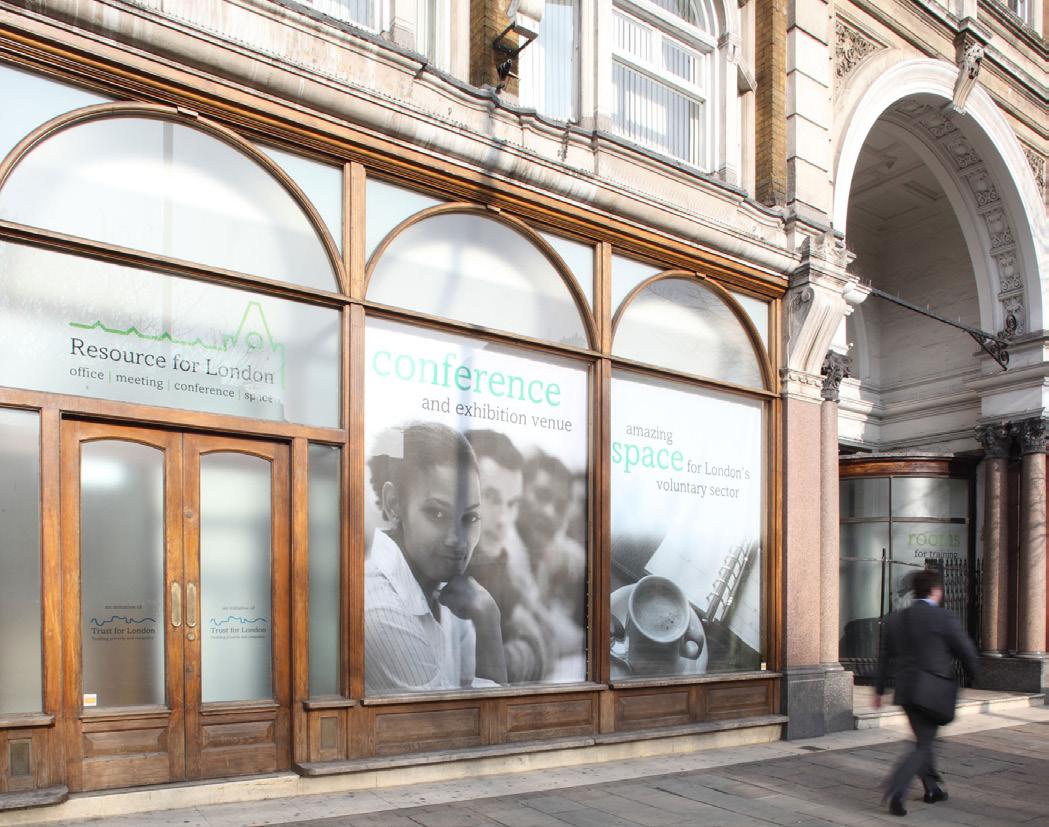
The accounts of Resource for London show a net unrestricted deficit of £107k and a net restricted surplus of £158k (2021 total net surplus £85k). It had total funds at 31 December 2022 of £489k (2021: funds £438k). The performance of Resource for London is shown in the SOFA within the restricted funds of the Trust.
Trust for London owns playing fields in Bellingham which are the direct responsibility of the Trust through its subsidiary, Bellingham Community Project Limited (BCP), a registered charity, which runs a leisure and lifestyle centre on the site for the benefit of the local community.
The accounts of the Project show net outgoing resources of £56k (2021: incoming £33k) after receipt of £25k (2021: £20k) in grants from the Trust. It had total net assets at 31 December 2022 of £2.7 million (2021: £2.7 million).
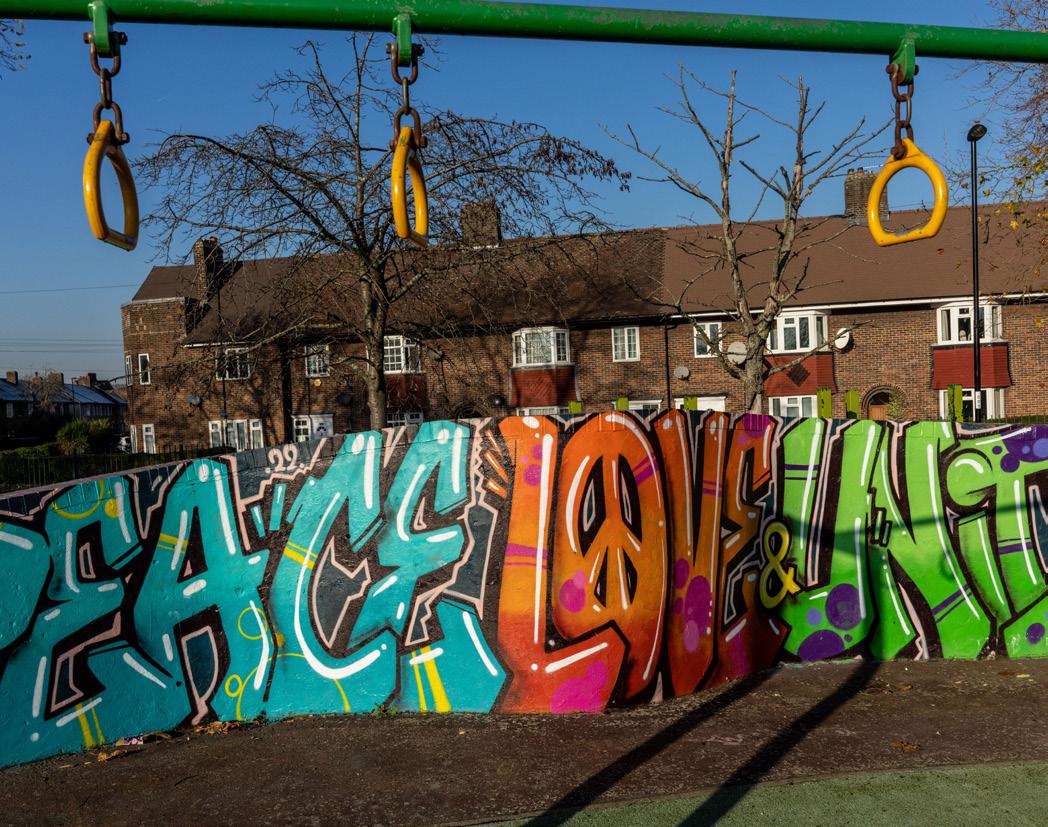
Financial resources are well placed to manage the business risks. Our planning processes have taken into account the current uncertain economic climate and its potential impact on sources of income. In particular the Board and Senior Management Team have been regularly monitoring and reporting on the potential impact of the economic climate on the organisation and its stakeholders. The Board has considered budgets and forecasts for the period to December 2023 and are satisfied the funds available within the Trust’s substantial endowment are sufficient to cover existing commitments and planned spending over this period. As such, the Board considers that all appropriate steps have been taken to effectively manage these risks and that overall there are no material uncertainties that call into doubt the charity’s ability to continue. The accounts have therefore been prepared on a going concern basis.
The Trust has a formal risk management process to assess business risks and implement risk management strategies in the context of the Trust’s strategic plan for 2018-2023. This involves identifying the types of risks it faces, categorising them in terms of potential impact and likelihood of occurrence, and identifying means of mitigating the risks.
The most significant risks identified by the Trust and the plans for mitigating these are as follows:
• Adverse public and media comment: The trust strives to work with propriety and seek legal advice with regards to riskier work. It has developed a communications strategy to ensure consistent messaging and undertaken crisis media training.
• A crash in the financial and property markets and/or excessive volatility in the markets: The Trust uses asset allocation to spread portfolio risk and tasks the individual asset committees to assess risk. Securing good quality advice is also seen as a useful step towards minimising risk.
• Fraud or misappropriation of funds by recipients or virus infiltration of IT: The Trust have a fraud policy in place. Grants managers visit and monitor grantees. Fraud is reviewed regularly at grants committees. Monitoring of financial controls and reporting.
• Financial underperformance of subsidiaries: Appointment of trustees and staff on subsidiary boards. Regular reporting of subsidiaries to Trust board and committees. Additional support agreed where necessary.
It is the Trust’s policy not to maintain any unrestricted reserves as ongoing working capital is available from the endowment under the total return policy adopted. The total value of funds at 31 December 2022 was £317.7 million, of which the endowment stood at £308.6 million with the balance of funds being £4.6 million of restricted funds relating to the Trust’s subsidiaries and £4.4 million of restricted funds being the amount unspent from the grant budget, a proportion of which is permitted to be carried over at the year end.
The trustee is Trust for London Trustee which exists solely for the purpose of carrying out the duties of the trustee and associated activities of Trust for London. All financial transactions are reported by Trust for London. These consolidated accounts incorporate the entities shown within the dotted lines. Trust for London also has a 30.22% equity holding in the Social Justice and Human Rights Centre Limited.
Trust for London is made up of three funds. The Central Fund which aims to tackle poverty and inequality in London, the City Church Fund for the advancement of religion and the Trust for London Common Investment Fund, established to pool the investment assets of the other two funds. Trust for London Trustee, the corporate trustee of the charity, has up to 18 Board member trustees who are normally appointed by a variety of nominating bodies or by itself.
All trustees are appointed on a five year term. All trustees give their time freely and no trustee remuneration was paid in the year. Details of trustee expenses and related party transactions are disclosed in the financial statements. A full induction programme is provided for all new trustees. Trustees are required to disclose all relevant interests and withdraw from decisions where a conflict of interest arises in accordance with policy.
Trust for London Trustee (charitable company)
The London Trust (dormant charity)
Bellingham Community Project Limited (charitable company)
Bellingham Community Project Management Company Limited (trading company)
Trust for London (charity)
Resource for London (charitable company)
Greenford Playing Fields Limited (dormant charity)
The trustees consider the Board of trustees and the senior management team as comprising the key management personnel of the charity in charge of directing and controlling the charity and running and operating the charity on a day to day basis. The Board, which meets quarterly, has ultimate oversight and responsibility for the Trust’s activities but has delegated decision making to Board Committees and delegation of grant-making power to senior staff, with Trustees involvement on grant decisions focused on high-risk applications.
Through the work of the Governance Committee, and by conducting reviews of the Board’s governance arrangements, the Trust aims to ensure an appropriate, and diverse, balance of skills, experience and backgrounds amongst trustees. The Trust believes that effective decision-making is reflected throughout the organisation through a clear system of delegation and robust management and control systems.
Trust for London, a Living Wage employer, is committed to ensuring that we pay our staff fairly and in a way which ensures we attract and retain the right skills to have the greatest impact in delivering our charitable objectives. In accordance with the Charities SORP FRS 102 the Trust discloses:-
• all payments to trustees (no trustees are remunerated)
• the number of staff in receipt of more than £60,000 and above (in bands of £10,000)
• pensions and other benefits
The Trust’s Chair, in consultation with the Vice Chair and Chair of Finance & Resources Committee, has governance responsibility for the oversight of the Chief Executive’s pay reviews, whilst the Trust’s Finance & Resources Committee have oversight of staff pay reviews. Both report to the Board of Trustees.
The Finance & Resources Committee meets annually to consider staff remuneration. The Chief Executive and members of the Senior Management Team are in attendance for the meeting. Its main responsibilities are to:-
• conduct five-yearly reviews of staffing structures and salaries
• decide the terms and conditions of service of the Trustee’s staff
• approve the annual cost of living percentage increase (which can be zero) taking into account a variety of indices
• approve any incremental increases
• approve any pay awards and staff salary increases outside of the annual review process as recommended from time to time by the Chief Executive
• determine pension arrangements
• approve staff policies
Further information on staffing costs and pensions is presented in the notes to the financial statements.
We have audited the financial statements of Trust for London (‘the charity’) and its subsidiaries (‘the group’) for the year ended 31 December 2022 which comprise the Consolidated Statement of Financial Activities, Consolidated and Trust Balance Sheets, Consolidated Statement of Cash Flows and notes to the financial statements, including significant accounting policies. The financial reporting framework that has been applied in their preparation is applicable law and United Kingdom Accounting Standards, including Financial Reporting Standard 102 The Financial Reporting Standard applicable in the UK and Republic of Ireland (United Kingdom Generally Accepted Accounting Practice).
In our opinion the financial statements:
• give a true and fair view of the state of the group’s and the parent charity’s affairs as at 31 December 2022 and of the group’s income and expenditure, for the year then ended;
• have been properly prepared in accordance with United Kingdom Generally Accepted Accounting Practice; and
• have been prepared in accordance with the requirements of the Charities Act 2011.
We conducted our audit in accordance with International Standards on Auditing (UK) (ISAs (UK)) and applicable law. Our responsibilities under those standards are further described in the Auditor’s responsibilities for the audit of the financial statements section of our report. We are independent of the group in accordance with the ethical requirements that are relevant to our audit of the financial statements in the UK, including the FRC’s Ethical Standard, and we have fulfilled our other ethical responsibilities in accordance with these requirements. We believe that the audit evidence we have obtained is sufficient and appropriate to provide a basis for our opinion.
In auditing the financial statements, we have concluded that the trustee’s use of the going concern basis of accounting in the preparation of the financial statements is appropriate.
Based on the work we have performed, we have not identified any material uncertainties relating to events or conditions that, individually or collectively, may cast significant doubt on the charity’s or the group’s ability to continue as a going concern for a period of at least twelve months from when the financial statements are authorised for issue.
Our responsibilities and the responsibilities of the trustees with respect to going concern are described in the relevant sections of this report.
The trustees are responsible for the other information contained within the annual report. The other information comprises the information included in the annual report, other than the financial statements and our auditor’s report thereon. Our opinion on the financial statements does not cover the other information and, except to the extent otherwise explicitly stated in our report, we do not express any form of assurance conclusion thereon.
Our responsibility is to read the other information and, in doing so, consider whether the other information is materially inconsistent with the financial statements or our knowledge obtained in the audit or otherwise appears to be materially misstated. If we identify such material inconsistencies or apparent material misstatements, we are required to determine whether this gives rise to a material misstatement in the financial statements themselves. If, based on the work we have performed, we conclude that there is a material misstatement of this other information, we are required to report that fact.
We have nothing to report in respect of the following matters in relation to which the Charities (Accounts and Reports) Regulations 2008 requires us to report to you if, in our opinion:
• the information given in the financial statements is inconsistent in any material respect with the trustees’ report; or
• sufficient and proper accounting records have not been kept by the parent charity; or
• the financial statements are not in agreement with the accounting records and returns; or
• we have not received all the information and explanations we require for our audit.
As explained more fully in the trustees’ responsibilities statement set out on page 69, the trustees are responsible for the preparation of the financial statements and for being satisfied that they give a true and fair view, and for such internal control as the trustees determine is necessary to enable the preparation of financial statements that are free from material misstatement, whether due to fraud or error.
In preparing the financial statements, the trustees are responsible for assessing the group and the parent charity’s ability to continue as a going concern, disclosing, as applicable, matters related to going concern and using the going concern basis of accounting unless the trustees either intend to liquidate the charity or to cease operations, or have no realistic alternative but to do so.
We have been appointed as auditor under section 151 of the Charities Act 2011 and report in accordance with the Acts and relevant regulations made or having effect thereunder.
Our objectives are to obtain reasonable assurance about whether the financial statements as a whole are free from material misstatement, whether due to fraud or error, and to issue an auditor’s report that includes our opinion. Reasonable assurance is a high level of assurance, but is not a guarantee that an audit conducted in accordance with ISAs (UK) will always detect a material misstatement when it exists. Misstatements can arise from fraud or error and are considered material if, individually or in the aggregate, they could reasonably be expected to influence the economic decisions of users taken on the basis of these financial statements.
Details of the extent to which the audit was considered capable of detecting irregularities, including fraud and noncompliance with laws and regulations are set out below.
A further description of our responsibilities for the audit of the financial statements is located on the Financial Reporting Council’s website at: www.frc.org.uk/auditorsresponsibilities. This description forms part of our auditor’s report.
Irregularities, including fraud, are instances of non-compliance with laws and regulations. We identified and assessed the risks of material misstatement of the financial statements from irregularities, whether due to fraud or error, and discussed these between our audit team members. We then designed and performed audit procedures responsive to those risks, including obtaining audit evidence sufficient and appropriate to provide a basis for our opinion.
We obtained an understanding of the legal and regulatory frameworks within which the charity and group operates, focusing on those laws and regulations that have a direct effect on the determination of material amounts and disclosures in the financial statements. The laws and regulations we considered in this context were the Charities Act 2011 together with the Charities SORP (FRS102) 2019. We assessed the required compliance with these laws and regulations as part of our audit procedures on the related financial statement items.
In addition, we considered provisions of other laws and regulations that do not have a direct effect on the financial statements but compliance with which might be fundamental to the charity’s and the group’s ability to operate or to avoid a material penalty. We also considered the opportunities and incentives that may exist within the charity and the group for fraud. The laws and regulations we considered in this context were the Companies Act 2006 together with the Charities SORP (FRS 102). We assessed the required compliance with these laws and regulations as part of our audit procedures on the related financial statement items.
Auditing standards limit the required audit procedures to identify non-compliance with these laws and regulations to enquiry of the Trustees and other management and inspection of regulatory and legal correspondence, if any.
We identified the greatest risk of material impact on the financial statements from irregularities, including fraud, to be within the override of controls by management. Our audit procedures to respond to these risks included enquiries of management and the Finance & Resources Committee about their own identification and assessment of the risks of irregularities, sample testing on the posting of journals, reviewing accounting estimates for biases, reviewing regulatory correspondence with the Charity Commission and reading minutes of meetings of those charged with governance.
Owing to the inherent limitations of an audit, there is an unavoidable risk that we may not have detected some material misstatements in the financial statements, even though we have properly planned and performed our audit in accordance with auditing standards. For example, the further removed non-compliance with laws and regulations (irregularities) is from the events and transactions reflected in the financial statements, the less likely the inherently limited procedures required by auditing standards would identify it. In addition, as with any audit, there remained a higher risk of non-detection of irregularities, as these may involve collusion, forgery, intentional omissions, misrepresentations, or the override of internal controls. We are not responsible for preventing non-compliance and cannot be expected to detect non-compliance with all laws and regulations.
This report is made solely to the charity’s trustees, as a body, in accordance with Part 4 of the Charities (Accounts and Reports) Regulations 2008. Our audit work has been undertaken so that we might state to the charity’s trustees those matters we are required to state to them in an auditor’s report and for no other purpose. To the fullest extent permitted by law, we do not accept or assume responsibility to anyone other than the charity and the charity’s trustees as a body, for our audit work, for this report, or for the opinions we have formed.
Statutory Auditor London
Date: 31st August 2023
Crowe U.K. LLP is eligible for appointment as auditor of the charity by virtue of its eligibility for appointment as auditor of a company under section 1212 of the Companies Act 2006.
All income derives from continuing operations. There have been no recognised gains or losses other than the net movement in funds in the year.
The notes on pages 80 to 107 form part of these accounts.
The accounts were approved and authorised for issue by the Board on 7 July 2023 and signed on their behalf by: Omar Khan, Chair.
The notes on pages 80 to 107 form part of these accounts.

The charity has taken advantage of the exemptions in FRS 102 from the requirements to present a charity only Cash Flow Statement.
Trust for London is a charity registered in England and Wales governed by a 31 December 2004 scheme which operates from 4 Chiswell Street London EC1Y 4UP.
The financial statements are prepared under the historical cost convention with items recognised at cost or transaction value unless otherwise stated in the relevant notes to these accounts.
The accounts (financial statements) have been prepared in accordance with the Statement of Recommended Practice: Accounting and Reporting by Charities preparing their accounts in accordance with the Financial Reporting Standard applicable in the UK and Republic of Ireland (FRS 102) issued on 16 July 2014 and the Financial Reporting Standard applicable in the United Kingdom and Republic of Ireland (FRS 102) and the Charities Act 2011 and UK Generally Accepted Practice as it applies from 1 January 2015.
Financial resources are well placed to manage the business risks. Our planning processes have taken into account the current uncertain economic climate and its potential impact on sources of income. In particular the Board and Senior Management Team have been regularly monitoring and reporting on the potential impact of Covid-19 on the organisation and its stakeholders since March 2020, and have been taking the appropriate action to mitigate as far as possible any immediate and ongoing financial and operational impact. The areas under review are formally included within the risk management process and include the impact on grantees and subsidiary companies, the impact on cash flow, the protection of the endowment fund and the care and safety of staff in following Government regulations relating to the pandemic. The Board has considered budgets and forecasts for the period to December 2022 and are satisfied the funds available within the Trust's substantial endowment are sufficient to cover existing commitments and planned spending over this period. As such, the Board considers that all appropriate steps have been taken to effectively manage these risks and that overall there are no material uncertainties that call into doubt the charity's ability to continue. The accounts have therefore been prepared on a going concern basis. The Board continues to monitor investment performance regularly.
The accounts have been prepared to give a ‘true and fair’ view and have departed from the Charities (Accounts and Reports) Regulations 2008 only to the extent required to provide a ‘true and fair’ view. This departure has involved following Accounting and Reporting by Charities preparing their accounts in accordance with the Financial Reporting Standard applicable in the UK and Republic of Ireland (FRS 102) issued on 16 July 2014 rather than the Accounting and Reporting by Charities: Statement of Recommended Practice effective from 1 April 2005 which has since been withdrawn.
In the application of the charity’s accounting policies, which are described in note 2, the trustee is required to make judgements, estimates and assumptions about the carrying value of assets and liabilities that are not readily apparent from other sources. The estimates and underlying assumptions are based on historical experience and other factors that are considered to be relevant. Actual results may differ from these estimates.
The estimates and underlying assumptions are reviewed on an on-going basis. Revisions to accounting estimates are recognised in the period in which the estimate is revised if the revision affects only that period, or in the period of the revision and future periods if the revision affects the current and future periods.
The key sources of estimation uncertainty that have a significant effect on the amounts recognised in the accounts are described in the accounting policies and are summarised below:
• Valuation of investment properties and valuation of land and buildings - the charity’s investment properties and land and buildings other than the Bellingham Leisure & Lifestyle Centre are stated at their estimated fair value based on professional valuations as disclosed in notes 10 and 11
• Multi-year grant commitments - the charity recognises future liabilities discounted to their present value where material.
No material loss to investment value post balance sheet has arisen as a result of coronavirus.
The charity has taken advantage of the exemptions in FRS 102 from the requirements to present a charity only Cash Flow Statement and certain disclosures about the charity’s financial instruments.
(i) Basis of consolidation
Resource for London and Bellingham Community Project Limited have been treated as subsidiary undertakings as defined in the SORP. Therefore all their transactions are accounted for gross in these accounts. The funds of these subsidiaries have been treated as restricted funds of the charity. Bellingham Community Project Management Company Limited is treated as a subsidiary as defined in the SORP. The costs of this company are shown on separate lines in the Statement of Financial Activities.
(ii) Income and expenditure
All income is recognised in the Statement of Financial Activities once the charity has entitlement to the income, it is probable that the income will be received and the amount of income receivable can be measured reliably.
All income is accounted for on an accruals basis.
Grants receivable and donations are recognised upon notification in writing of the amount awarded or donated and date of entitlement.
Resource for London rent, service charge income and similar income represents income from the operation of Resource for London at 356 Holloway Road, London, N7.
Investment income and related tax credits are recognised upon notification in writing of the amount and date of entitlement.
In some cases the Trust pays property expenses on behalf of its tenants and recovers these expenses in full. In such circumstances the Trust has thought it appropriate to show these service charge expenses as a deduction from income on the face of the Statement of Financial Activities.
Liabilities are recognised in the Statement of Financial Activities as expenditure as soon as there is a legal or constructive obligation committing the charity to that expenditure, it is probable that settlement will be required and the amount of the obligation can be measured reliably. All expenditure is accounted for on an accruals basis.
Raising funds comprise those operational costs directly attributable to managing the investment and property portfolio and raising investment and rental income, those expended on marketing and an appropriate proportion of general overheads which are identifiable wholly or mainly in support of raising funds.
Charitable activities include grants made for charitable purposes from the Central Fund at the discretion of the Trust. These are charged to grants payable when they are approved by the Trust and notified to the beneficiaries. When grants are withdrawn or unclaimed they are shown as a deduction from grants payable. Grants made by the Trust but not paid at the year end are carried forward as a liability. They also include grants staff costs, consultants and an appropriate proportion of general overheads which are identifiable wholly or mainly in support of charitable expenditure.
Resource for London costs relate directly to the operation of Resource for London. Bellingham Community Project costs relate directly to the operation of Bellingham Community Project. Costs of trading subsidiary relate to the operations of Bellingham Community Project Management Company Ltd.
Governance costs are those incurred in connection with the governance arrangements of the Trust as opposed to those associated with charitable activity. They cover the costs of compliance with constitutional and statutory requirements and include audit fees, legal fees and costs of trustee meetings. They are shown within charitable activities and raising funds in an appropriate proportion.
Trust for London has financial assets and financial liabilities of a kind that qualify as basic financial instruments. Basic financial instruments are initially recognised at transaction value and subsequently measured at the present value of future cash flows (amortised cost). Financial assets held at amortised cost comprise cash at bank and in hand, short term cash deposits and the group’s debtors excluding prepayments. Financial liabilities held at amortised cost comprise the group’s short and long term creditors excluding deferred income and taxation payable. No discounting has been applied to these financial instruments on the basis that the periods over which amounts will be settled are such that any discounting would be immaterial. Investments (excluding property) are included in the balance sheet at their fair value as described in iv below.
Freehold and leasehold investment properties are included in the balance sheet at fair value (market value) at the balance sheet date. The valuation was prepared as at 31 December 2022 by Cluttons, Chartered Surveyors, in accordance with R.I.C.S. guidelines. The previous valuation had been carried out at 31 December 2021. Listed investments and indirect property holdings are shown at the middle market price ruling at the balance sheet date, with the exception of certain indirect property holdings which are shown at net asset value. Unlisted investments are shown at cost less impairment..
Gains and losses are reflected in the Statement of Financial Activities and allocated to the respective funds.
Loans are accounted for at the outstanding amount of the loan less any provision for unrecoverable amounts. Unquoted equity, social investment funds and partnerships are held at cost, less any provision for diminution in value, unless the Trust is able to obtain a reliable estimate of fair value. Quoted investments are stated at market value at the balance sheet date.
Associate entities are included in the balance sheet under the equity method of accounting ie initially recognised at cost and then subsequently adjusted to to reflect the charity's share of the post-acquisition change in the net assets of the associate.
Tangible fixed assets costing more than £1,000 are capitalised. All fixed assets other than freehold land and buildings are shown at cost less depreciation.
Freehold land and buildings other than the Bellingham Leisure & Lifestyle Centre is included in the balance sheet at fair value (market value) at the balance sheet date. The valuation was prepared as at 31 December 2022 by Cluttons, Chartered Surveyors, in accordance with R.I.C.S guidelines. The previous valuation had been carried out at 31 December 2021.
Depreciation is provided on all tangible fixed assets at rates calculated to write each asset down to its estimated residual value in equal instalments over its expected useful life as follows:
Investment freehold land and buildings - nil: Operational freehold buildings - 50 years: Operational leasehold land and buildings - life of the lease: Assets in the course of construction - nil: Leasehold improvements 4%: Computer equipment - 25%: Leisure & Lifestyle Centre equipment - 10%: Furniture and fittings - 20%.
Short term cash deposits are bank and money market deposits which do not have instant access but have a requirement for no more than three months notice before withdrawal.
There is a group personal pension scheme for staff. Contributions are accounted for as and when the amounts become payable.
Funds are available for use at the discretion of the Trust in furtherance of the general objectives of the Trust.
The investment assets of the Central Fund and the City Church Fund are held within the Trust for London Common Investment Fund. These assets are permanently endowed. Trustees confirm that, as per the total return policy adopted, funds can be transferred from the endowment fund to meet current liabilities obligations as they fall due.
Trust for London is considered to pass the tests set out in Paragraph 1 Schedule 6 Finance Act 2010 and therefore it meets the definition of a charitable trust for UK income tax purposes. Accordingly, the charity is exempt from taxation in respect of income or capital gains received, as long as the income and gains are all within categories covered by Part 10 Income Tax Act 2007 or Section 256 of the Taxation of Chargeable Gains Act 1992, and to the extent that such income or gains are applied exclusively to charitable purposes. Income tax will be payable to the extent that these conditions are not met.
Where appropriate, costs are shown inclusive of VAT as the charity is partially unable to recover VAT on its activities.
On 10 November 2003, the Charity Commissioners authorised the Trust to adopt a Total Return approach to the management of its investment portfolios.
On 1 January 2003 the Trust adopted this approach and selected 31 December 1942 as the reference date from which the permanently endowed funds have been analysed between the trust for investment and the unapplied total return, the two components of a permanent endowment specified in the Charity Commission's regulations. Under the total return approach, the Trust is permitted to allocate from the total return element of permanent endowment to the trust for application (income) such sums as it thinks appropriate in furtherance of its work providing it undertakes prescribed tasks. These tasks are essentially to exercise its statutory duty to be even-handed as between present and future beneficiaries, to maintain the balance of the unapplied total return at such a level that it will remain positive considering the volatility of investment markets and to take such professional advice as it considers necessary in the exercise of these responsibilities.
The Trust’s strategy is to manage the endowment effectively in order to maximise the amount available for distribution whilst maintaining the real value of the Trust’s permanent endowment.
A summary of the Trust's permanent endowment is as follows:
The aggregate value of the unapplied total return continues to form part of the permanent endowment and does not constitute a separate fund for accounting purposes.
Where costs are allocated the basis of apportionment is staff time spent on each activity.
Further details and analysis of grants made and consultancies undertaken is available in the Trustee's report and annual review.
Pension costs of £9,313 relate to the Bellingham Community Project Subsidiary. No other pension costs relate to restricted funds.
During the period, the Trust incurred no costs in relation to employee settlement agreements (2021: £48k)
The Trust considers its key management personnel comprise the trustees and the members of the Senior Management Team ie Chief Executive, Director of Finance and Resources, Directors of Grants and Director of Social Investment. The total employment benefits including employer pension contributions of the key management personnel were £555,666 (2021: £533,910).
No Board member received remuneration or any other benefits during the year (2021: nil). Out of pocket expenses were reimbursed to Board members as follows:
*Total historical cost at 31 December - -
*Historical cost of freehold land and buildings is shown as nil as the acquisition of the charitable properties occurred over fifteen years ago.
Freehold land and buildings represent a proportion of 350-356 Holloway Road, London, N7 which is occupied by Resource for London and the Bellingham Leisure & Lifestyle Centre managed by Bellingham Community Project Ltd. All fixed assets are held for charitable purposes.
Capital commitments planned for 2023 include a finance system implementation (£80,000) and leasehold improvements (£20,000). There are no other material capital commitments.
The Trust holds a 30.22% equity holding in the Social Justice and Human Rights Centre Limited (SJ&HRC). Accordingly an appropriate share of the net assets of SJ&HRC has been recognised in the group balance sheet as an investment in associate during the year as follows:
15
The Trust is entitled as landlord to income from investment properties under operating leases. For non-cancellable leases with lives of less than 25 years
Future minimum lease payments under non-cancellable operating leases for each of the following periods :-
For non-cancellable leases with lives of 25 years and over*
Future minimum lease payments under non-cancellable operating leases for each of the following periods :-
* these leases can have lives up to 1,000 years as they include ground rent leases which are valued at £87.5m and form some 65% of the portfolio.
The Trust as tenant has to pay rent under an operating lease at 4 Chiswell Street. For non-cancellable leases with lives of less than 25 years
Future minimum lease payments under non-cancellable operating leases for the each of the following periods :-
Lease payments recognised as an expense in the year were £288,209
The Trust provides a group personal pension scheme.
The Trust makes contributions at a rate of 10% to individuals' personal pensions within the group scheme, provided they make a personal contribution of at least 3%. During a transitional period, for certain members, the percentage of contributions may vary between 3% and 17% depending on the age of the employee. In 2022 the Trust made contributions of £146,296 (2021 : £157,016) to the scheme.
In addition staff at the Trust's subsidiary charities are entitled to contributions at a rate of 10% of gross salaries to a personal pension scheme. Total contributions made in 2021 at the Bellingham Community Project were £9,312.57 (2020: £12,042).
No staff are directly employed at Resource for London.
Staff were enrolled under auto-enrolment as from 1 June 2016.
Grants and charges between the Trust and its subsidiaries are shown as transfers between funds rather than as income in the Statement of Financial Activities.
The Central Fund spent in the year from its expendable endowment to supplement the income derived from it. The amount is shown by way of transfer between funds.
These funds have been shown as restricted because the charity's branches and associates have separate charitable purposes.
The purposes of these funds are:
Citizenship and Integration
Moving On Up
Strengthening Voices Realising Rights
Private Rented Sector
Disability Justice Fund
Racial Justice Fund
To improve social cohesion in London by working closely with the Mayor of London and the GLA
To improve employment rates for young black men
To support Deaf and Disabled people’s organisations (DDPOs) in their work protecting, promoting and advancing equal rights and inclusion for Deaf and Disabled Londoners (DDL).
To strengthen the voice of tenants in the private rented sector
Towards a strong, vibrant, diverse and sustainable disability justice movement
To increase economic empowerment among London's Black and minoritised communities
The entitlement of the two participating funds in the Common Investment Fund (also known as the Pool) at 1 January 2022 was 59.8% Central Fund and 40.2% City Church Fund. The entitlement remains unaltered at the year end at 59.8% Central Fund and 40.2% City Church Fund. The average entitlement over the year which is to be applied to the income distribution is also unaltered from 2021 and is 59.8% Central Fund and 40.2% City Church Fund. As a result, the allocation of income, gains and related expenditure across the two endowments has therefore been in the ratio 59.8% Central Fund and 40.2% City Church Fund.
Organisation Name
Resource for London
Charity number: 1015305
Company number: 02676631"
Bellingham Community Project
Charity number: 1036667
Company number: 02773345"
Bellingham Community Project Management Company
Company number: 03274735"
Nature of Organisation
Resource for London operates from offices at 356 Holloway Road, a property leased to it by the Trust. It is a resource centre for charities, providing them with office and meeting space.
Bellingham Community Project runs a leisure and lifestyle centre for the benefit of the local community which is managed by the London Borough of Lewisham and provides support for local community projects.
Bellingham Community Project Management Company's principal activity is to provide advisory services to charities, community groups, service providers and businesses who are looking to set up their own projects.
Ownership/Interest
Trust for London is the sole member of Resource for London. The liability of the member is limited to £1.
Bellingham Community Project is a charitable venture run by Trust for London in Bellingham. The liability of the members is limited to £1. The Trust has control over the Project by virtue of the fact that it has a majority vote on the Board of Directors of the company.
Bellingham Community Project Management Company Limited, a company incorporated in the UK, is a subsidiary of Bellingham Community Project Limited. The charity, through its charitable subsidiary Bellingham Community Project Limited, wholly owns the shares of Bellingham Community Project Management Company Limited.
Greenford Playing Fields
Charity number: 1036672
Company number: 02773351"
The company was treated as dormant in the year ended 31 December 2022.
Greenford Playing Fields Limited is a subsidiary of the Trust. The liability of the members is limited to £1. The Trust has a majority vote on the Board of Directors of the company.
Profit/loss for year ended 31st December 2022 Resource for London Bellingham Community Project Bellingham Community Project Management Company
Amounts payable of £300,000 (2021: £nil) were made by Resource for London to Trust for London for rent. The amount due to the Trust from Resource for London at the end of 2022 was £140,000 (2021: £230,000).
Grants totalling £25,000 (2021: £20,000) were made by the Trust towards running costs. During 2022 the Project Director was seconded to the Trust one day a week to work on mission-related investment projects for the Trust. The secondment fee paid to the Project was £15,456 (2021: £15,279) .
During 2022 Trust for London was a fellow trust of The London Trust, a charity which is also administered by Trust for London Trustee and which produces separate accounts. The charity is dormant.
Social Justice and Human Rights Centre Limited, also known as the Foundry, is an associate entity of the Trust. It is a company limited by share capital. The Trust has a significant influence over this company by virtue of the fact that it has a vote on the Board of Directors of the company and that it owns 30.22% of the share capital. See note 12Investment in associate.
The Trust has a policy for declaration of interests by both trustees and staff. The declaring of interests by a trustee forms part of a wider code of behaviour expected of trustees in fulfilling their obligations towards the Trust and its beneficiaries. There has been one situation during the year where a trustee or has declared a commercial interest in a transaction and as a result absented themselves from decision-making in the case of Peter Baxter who is the Chief Investment Officer of Snowball Impact Management Ltd. There were also instances where for example a trustee is also a trustee of another charity that has provided funding to the Trust, or a trustee of a grant applicant charity and also where trustees are employed by grant applicant charities which are not disclosed here. Any gifts or hospitality with a value of more than £50 are disclosed unless it is in the normal course of business.
The Trust has agreed to take on 90% of the costs of the repair obligations for the leisure centre falling to its subsidiary Bellingham Community Project Limited (BCP) under the lease with London Borough of Lewisham. As regards the future repair obligations, the potential extent of this liability is unknown and may be in place until 2053 should the original head lease signed by the Trust and BCP run to term.
The assets of the City Parochial Foundation come from the philanthropy of the people of London. Around 1,400 separate charitable gifts and bequests, some of them 400 years old, were held by the 112 parishes within the City of London, to be used for the benefit of the churches or, more often, the poor of those parishes. During the 19th century, the City grew to be a world financial centre and the income of these charities, rose substantially. In contrast, the number of beneficiaries fell. Some parishes had no residents at all.
On 10 August 1878, a Royal Commission was appointed to investigate the parochial charities of the City of London. Its report resulted in the City of London Parochial Charities Act, 1883. This Act provided that the five largest parishes should continue to manage their own charitable endowments, but that the bulk of the remainder should be administered by a new corporate body, to be known as the Trustees of the London Parochial Charities. It defined the area of benefit as the City of London and the Metropolitan Police District of London, the largest boundary definition available for Greater London. The endowments were brought together into two funds, a City Church Fund and a Central Fund. Together these constituted the City Parochial Foundation.
In 1986 the City Parochial Foundation became the Trustee of the Trust for London. The Trust was also endowed with £10m derived from the sale of the Greater London Council’s assets. It was tasked with targeted small locally based community organisations which were independent of larger bodies.
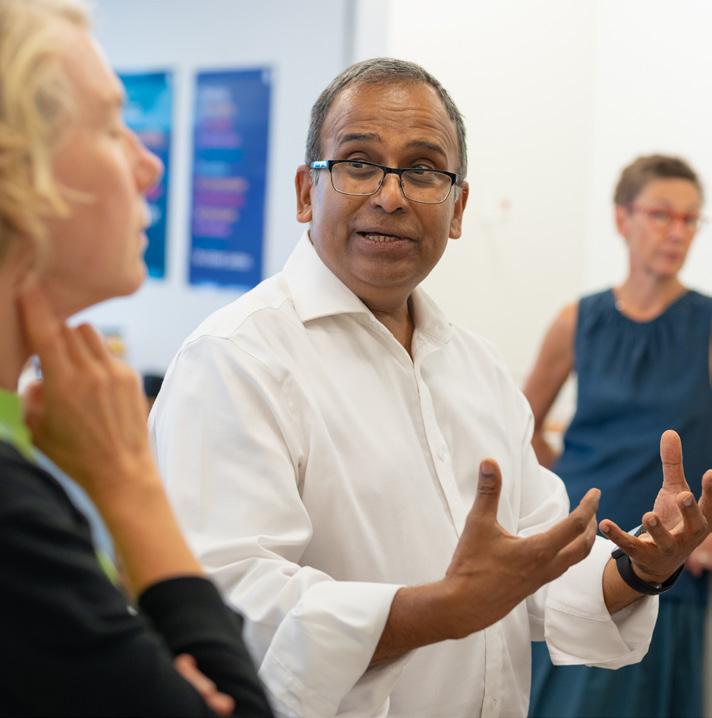
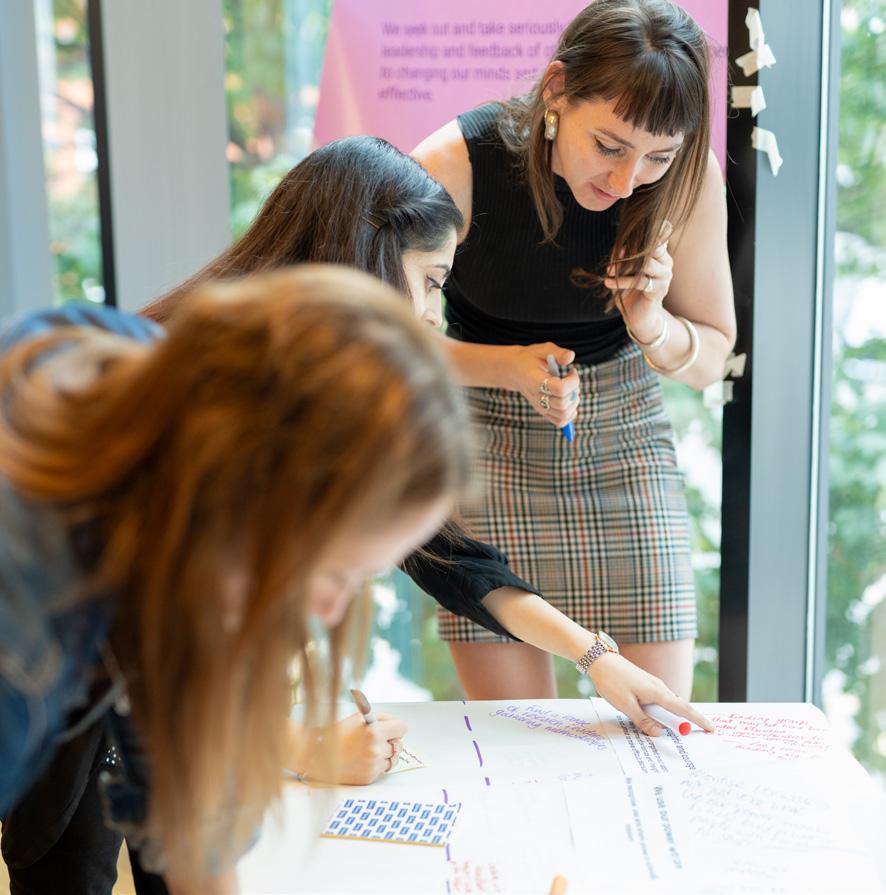
On 1 January 2010, all the assets and liabilities of the Trust for London were transferred to City Parochial by an Order of the Charity Commissioners dated 11 December 2009. As from 26 March 2010 the Central Governing Body was renamed the Board. All the entities were rebranded as at 1 July 2010. City Parochial Foundation Trustee was renamed Trust for London Trustee, City Parochial Foundation was renamed Trust for London and the former Trust for London was renamed The London Trust.
We celebrated our 125th anniversary in 2016 and after thirty years in Middle Street moved to new office premises in Chiswell Street in 2018.
Rehana Ameer
Peter Baxter
Andrew Brown OBE
Stephen Burns
Grey Collier (left September 2022)
Alexandra Doyle
Sir Peter Estlin (left March 2023)
Mayor Rokshana Fiaz
Tara Flood (term ended March 2022)
Alderman Alison Gowman
Jeff Hayes (term ended March 2023)
Nigel Howell
Denise Joseph
Dr Omar Khan (joined December 2022, Chair March 2023)
Meredith Niles
Rosemarie Paul
Nick Peters (joined September 2022)
Dr Onkar Sahota
Precious Sithole
Sonia Sodha
The Rt Revd Dr Joanne Woolway Grenfell
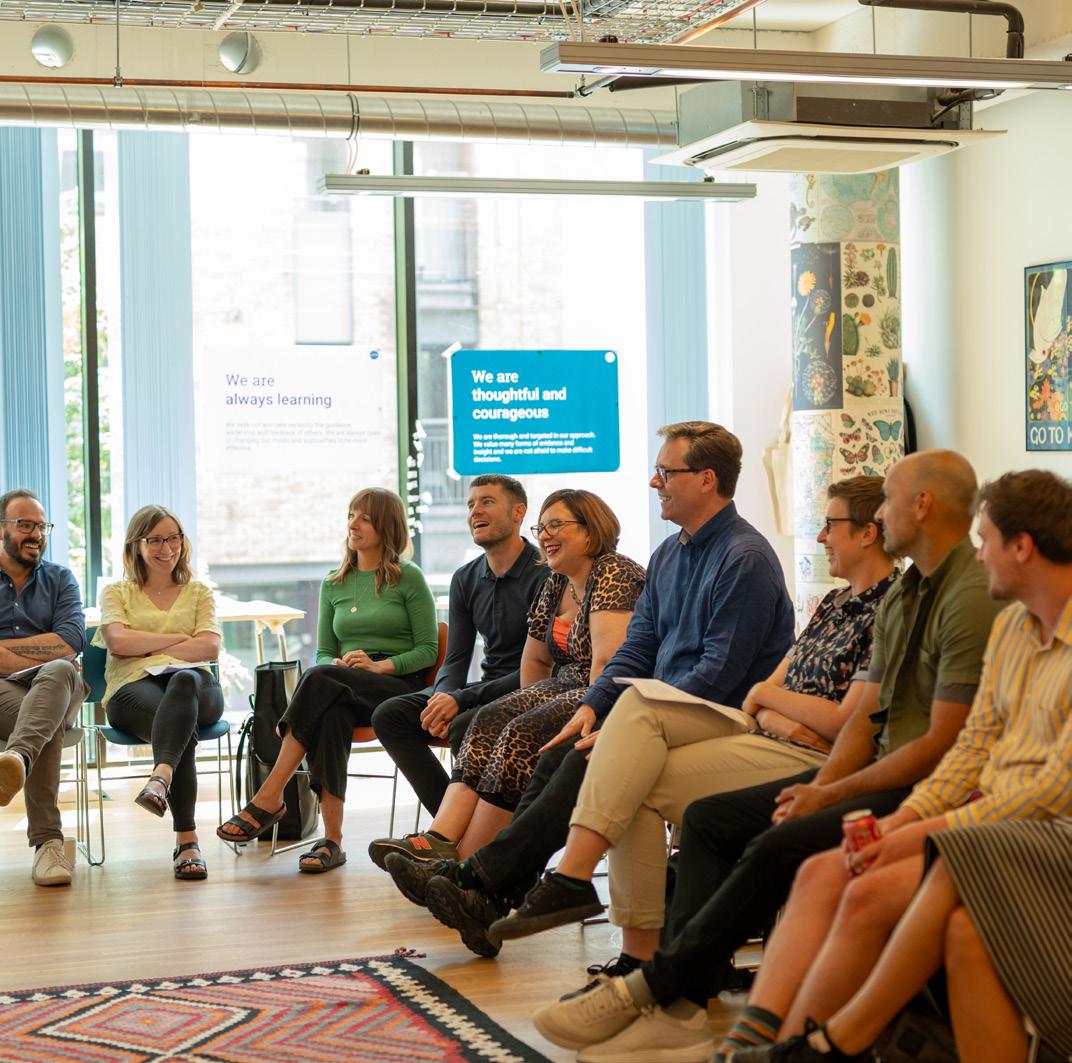
Bims Alalade
Andrew Allen
John Colbert
Luis Correia da Silva
Cliff Hawkins (term ended February 2023)
Sue Logan
Edward Lord OBE JP
Rebecca MacDonald
Loraine Martins MBE
Adam Matan
Babette May
Alison McDonald
Bernadette McKernan
Nick Peters (joined September 2022)
Jonathan Page
Jem Stein
Rickardo Stewart
Keith Swabey (joined September 2022)
Sara Vesey Hold (joined February 2023)
Professor Vikrant Vig (term ended April 2022)
Tunde Akinkunmi – finance manager
Jaspal Babra – senior grants administrator
Tania Bronstein – programme manager (retired July 2022)
Sue Caller – accounts assistant
Sioned Churchill – director of grants (retired May 2022)
Hilary Cornish – evaluation and learning manager
Johanna Cronin – head of communications
Susie Dye – grants manager
Emily Fiddy – senior communications officer (left March 2022)
Jamie Firby – communications officer (joined June 2022)
Douglas Gunn – director of social investment
Carol Harrison – director of finance (retired June 2022)
Manny Hothi – chief executive
Ugo Ikokwu – grants manager
Ayca Ilcen – executive assistant to the chief executive (left April 2023)
Luke Kavanagh – social investment manager
Jané Mackenzie – grants manager (joined August 2022)
Laura Mansfield – grants administrator
Winnel Radcliffe – office assistant
Deborah Ready – HR manager
Martin Reynolds – office manager
Jessica Rhodes – communications intern (joined July 2022)
Rebecca Roberts – grants manager
Julian Rouse – secondee
Klara Skrivanova – director of grants (joined March 2022)
Tina Stiff – IT manager
Alex Sutton – director of grants (joined July 2022)
Heather Taylor – director of finance and resources (joined July 2022)
Austin Taylor-Laybourn – grants manager
Helal Uddin Abbas – grants manager
Sioned Churchill and Carol Harrison retired in the summer of 2022 after each working over 20 years at the Trust. We would like to thank them for all their work.
